27/07/2023 - Children as flagbearers of hope
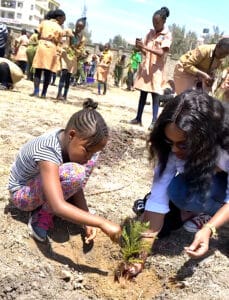
Growing trees with children
“Mummy, when are we going back to see the tree that I planted? I want to water it and see how tall it has grown!”
Above is a persistent question from my beautiful 8-year-old daughter. Her name is Natalie.
Celebrating 10 years of work and commitment to ending child poverty, as part of the ECP@10 grow trees with children campaign, on 22nd October 2022 Arigatou International’s, End Child Poverty led by an amazing team, joined efforts in a tree planting exercise. The event took place at Administration Police Training College (APTC), where over 10,000 trees and tree seedlings were donated and planted.
The grow trees with children campaign was informed by the reality that climate change is unquestionably an ongoing threat to poverty reduction. Climate change is further a direct threat to a child’s ability to survive, grow, and thrive. Often, children bear the indirect brunt of climate injustice particularly those already living in poverty.
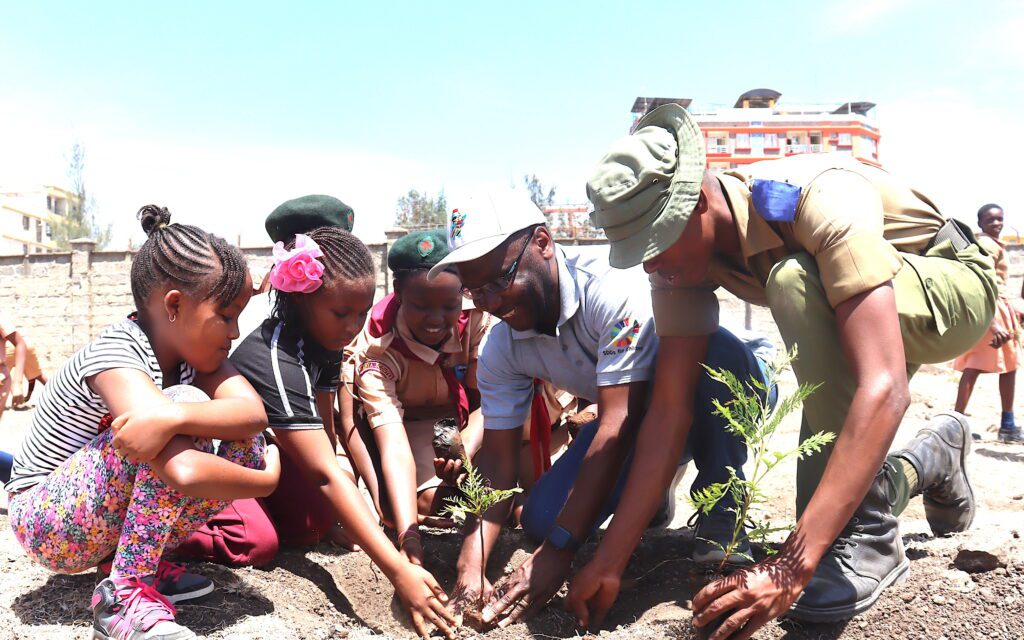
Remember when we said we are ‘leaving no one behind’– a pledge that lies at the heart of the SDG framework? Well, Halfway to the deadline for the 2030 Agenda, the SDG Progress Report; Special Edition shows we are leaving more than half the world behind. I am certain that all who have put in the work towards achieving the latter are disappointed but not surprised. The same report highlights that we have entered an age of poly-crisis where conflict, climate change, the lingering effects of the COVID-19 pandemic, and other global challenges are threatening to derail hard-earned progress toward the achievement of the SDGs. My supervisor Dr. Mustafa Y. Ali, Secretary General of the Global Network of Religions for Children, a man who sought after my own heart due to his passion for children and their well-being believes that the 4th of the 3 C’s (mentioned above) is CHILDREN. Yes! Children… why children you may wonder? The answer is simple, ‘If we care for them today, they will change the world tomorrow.
Think about it! If we are truly working towards building a better world, more so for children, why not involve them in the processes that will lead to the achievement and retention of the same? I couldn’t agree more, an investment in the child today, is additionally one in the future—a better future!
At my daughter’s tender age, through the tree planting exercise, she has learned 1) the value of planting a tree (more biblical for me, I could share endless quotes from the bible that document the same, actually, I will; refer to 2 Corinthians 9:10) and 2) that for anything to grow, it must be nurtured. The tree she planted should be 8 months old now. I don’t know what her expectations are… I hope she is neither disappointed nor surprised (pun intended); back to her question, I will take her to visit her tree, soon!
I can’t help but imagine a world where every child understands what planting a tree today can do for the world tomorrow. How do we equip our children with skills and knowledge that present a sustainable environment and respond to the need for climate action?
A humble start towards the same would be, Joining and supporting the ‘grow trees with children’ campaign and donating to this great course.
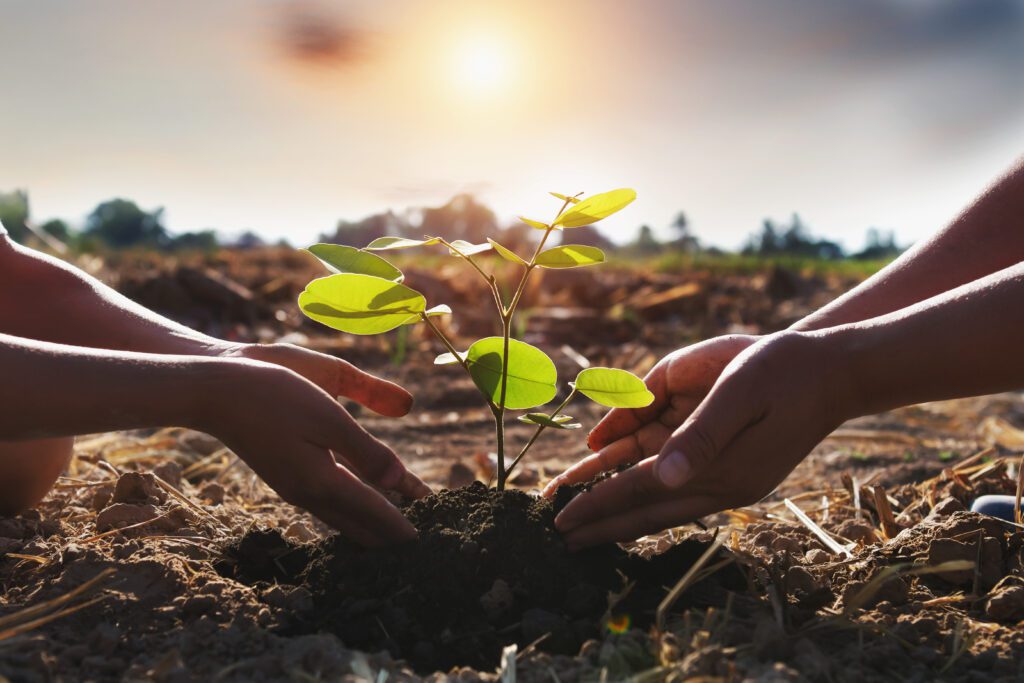
Allow me to leave you with a Chinese proverb “The best time to plant a tree was 20 years ago. The second best time is now.
Heartfelt gratitude to my friends and colleagues!
The post Children as flagbearers of hope appeared first on End Child Poverty.
The post Children as flagbearers of hope appeared first on Arigatou International.
17/07/2023 - Children account for half of the world’s poor population – MPI 2023
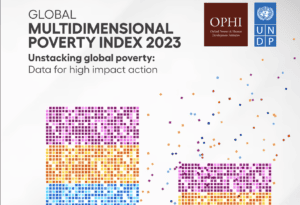
Children under 18 years old account for half ((566 million) of the Multidimensional Poverty Index (MPI) – poor people in the world, the 2023 Global MPI report has revealed.
The report reveals that 54.1 percent of poor children live in Sub-Saharan Africa, making poverty reduction for these 306 million children a vital focus for the region. On the other hand, the MPI shows that South Asia is home to 177 million poor children, or 31 percent of poor children. Across 110 countries 27.7 percent of children are poor, compared with 13.4 percent of adults. This situation calls for urgent actions and engagement in reducing child poverty.
On a positive note, the report shows that some countries recorded remarkable reductions in poverty. For example, India saw 415 million people exiting poverty within just 15 years from 2005 to 2021. And, in just four years from 2010, more people exited poverty in China (69 million) than live in the UK. While Indonesia saw an eight million reduction in the number of MPI poor in the five years to 2017.
Overall, the report, covering 110 countries’ MPI ratings, demonstrates that poverty reduction is achievable. But lack of comprehensive data over the COVID-19 pandemic poses challenges in assessing immediate prospects, according to the compilers.
Despite these encouraging trends, the lack of post-pandemic data for most of the 110 countries covered by the global MPI restricts understanding of the pandemic’s effects on poverty.
The global MPI is a key international resource that measures acute multidimensional poverty across more than 100 developing countries. First launched in 2010 the global MPI advances SDG 1—ending poverty in all its forms everywhere— and measures interconnected deprivations across indicators related to SDGs 1, 2, 3, 4, 6, 7 and 11. The global MPI is produced by the Oxford Poverty and Human Development Initiative (OPHI) and other partners. OPHI is a member of the Global Coalition to End Child poverty, which Arigatou International – End Child Poverty is part of. We believe in data and evidence, such as the global MPI as a pathway to addressing child poverty.
Read/Download the global MPI report > https://ophi.org.uk/global-mpi-2023/
The post Children account for half of the world’s poor population – MPI 2023 appeared first on End Child Poverty.
The post Children account for half of the world’s poor population – MPI 2023 appeared first on Arigatou International.
12/06/2023 - Celebrating the World Environment Day at the SDGs Academy for Children.
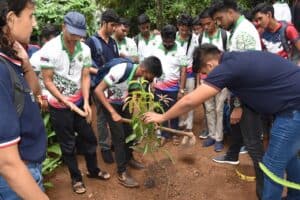
In commemoration of the World Environment Day, the SDGs Academy ‘Model Classroom’ organised a learning and tree planting session with 24 students from Maris Stella College Negombo, Sri Lanka.
The session, which in part took place within the Academy premises took the students through an understanding of SDGs 6 (Clean Water and Sanitation), 13 (Climate Action), 14 (Life Below Water) and 15 (Life on Land). The choice of these SDGs was informed by their close relation to the environment and the different ecosystems. Addressing these SDGs in particular, among other goals, will go a long way in preserving and enhancing the environment and the global climate scourge in general.
“The Model classroom is the classroom we are looking for in our school. A friendly space for us to learn, be innovative, and be ourselves with our fresh ideas. Thank you Arigatou International for creating that space for us to learn SDGs and be innovative in our own way” – Venuja, 15 years old boy from Sri Lanka.
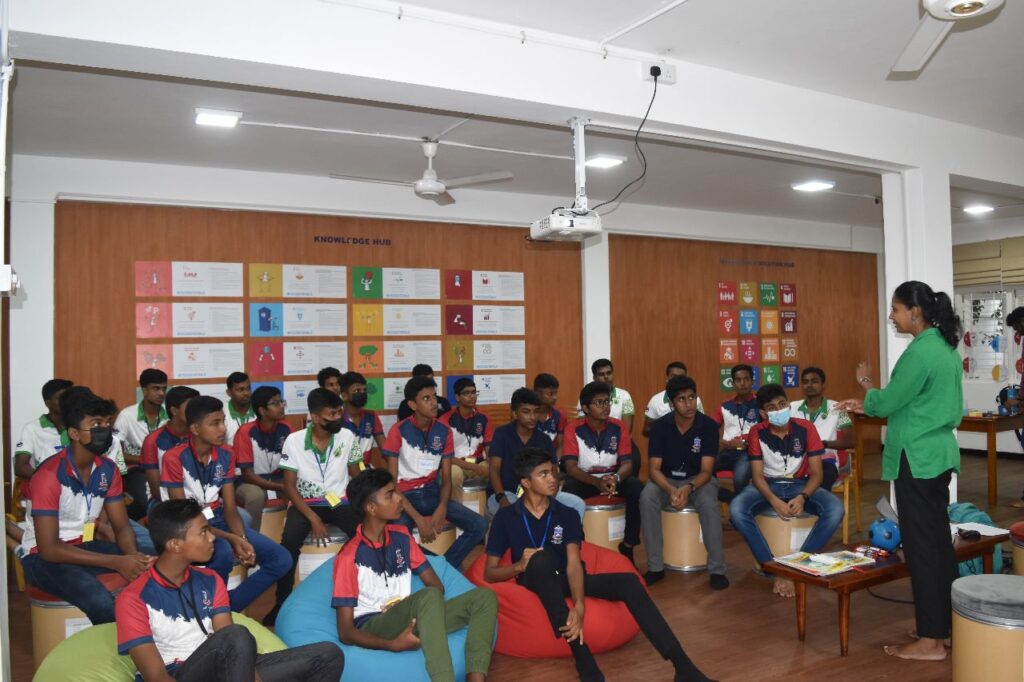
Discussions around these SDGs were linked to the Day’s theme: Solutions to Plastic Pollution – a call for global action to end plastic pollution. This was informed by worrying reports that each year, an estimated 11 million tonnes of plastic waste flows into the world’s oceans; this volume is expected to triple by 2040.
Discussions in the SDGs Academy for Children were followed by tree planting activities. The students and staff from the Academy/Sarvodaya Shramadana Movement planted mango trees signifying their commitment to conserve the environment and enhancing food production through fruits born out of the mango trees.
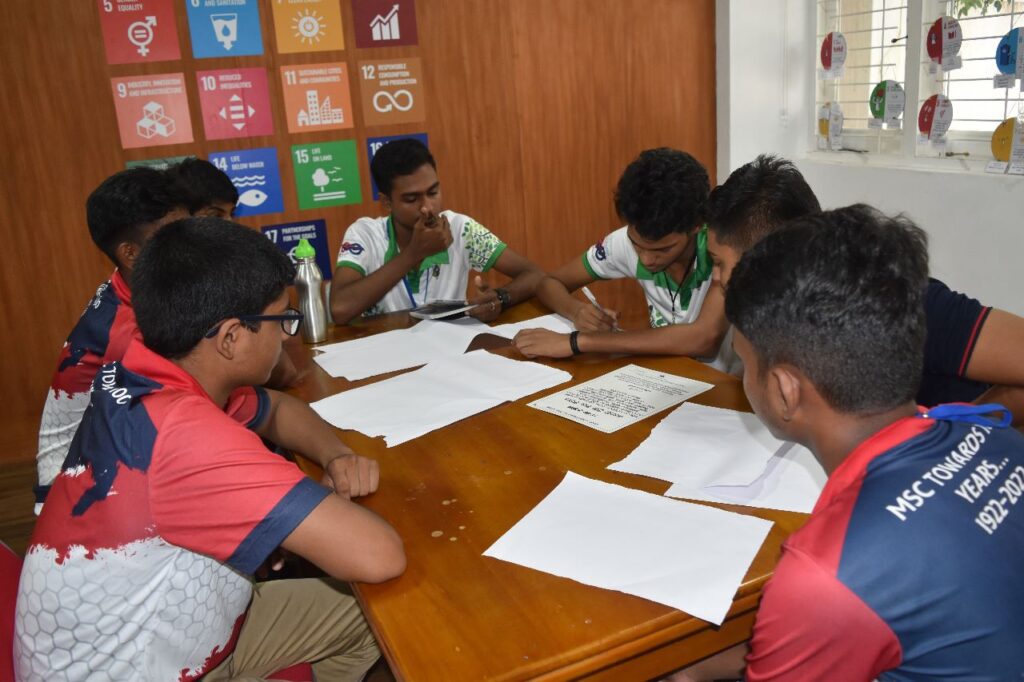
Further, the students pledged to take deliberate and continued action towards achieving the SDGs, after an exciting enlightenment about the global goals at the Academy. The Model Classroom aims to keep and advance such partnerships with institutions in order to raise more awareness about the SDGs and the need to involve young people in achieving the goals.
“This is not only a space or a learning course for children to learn about SDGs: This is something beyond that, where children could learn about their lives and change their way of living for a better world that we are dreaming of as adults. This is a place even adults could learn and contribute to a better world with children” Jude Preman, teacher, Maris Stella College, Negombo
Declared by the United Nations in 1972, the World Environment Day to highlight that the protection and health of the environment is a major issue, which affects the well-being of peoples and economic development throughout the world. The celebration of this day provides us with an opportunity to broaden the basis for an enlightened opinion and responsible conduct by individuals, enterprises and communities in conserving the environment.
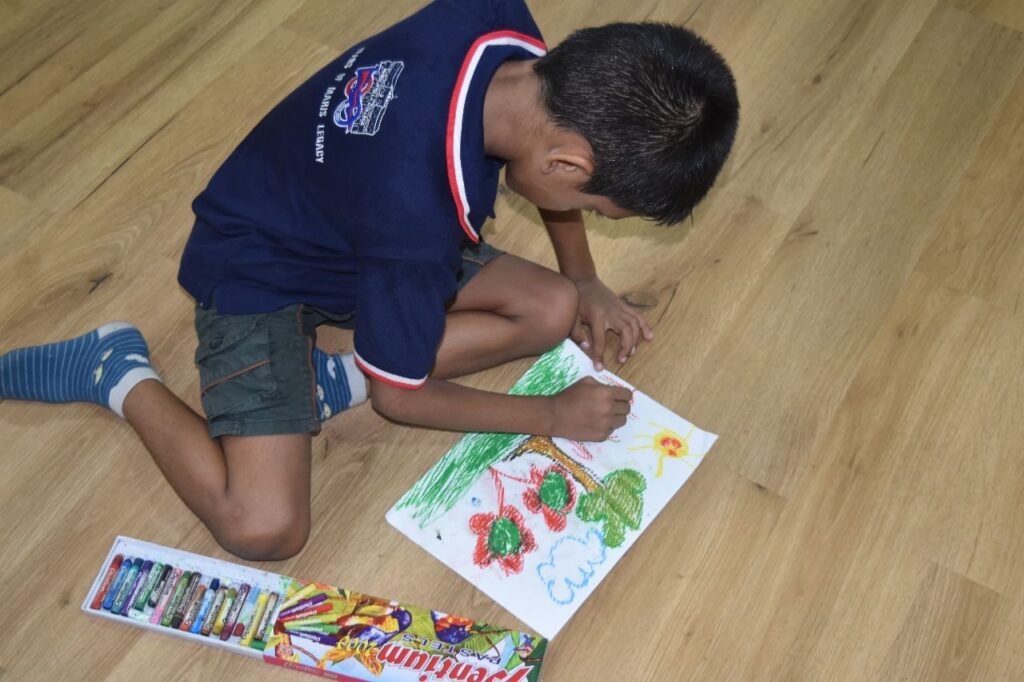
The post Celebrating the World Environment Day at the SDGs Academy for Children. appeared first on End Child Poverty.
The post Celebrating the World Environment Day at the SDGs Academy for Children. appeared first on Arigatou International.
05/06/2023 - Youth Economic Development and Peacebuilding
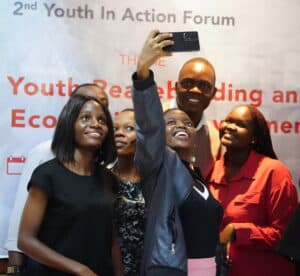
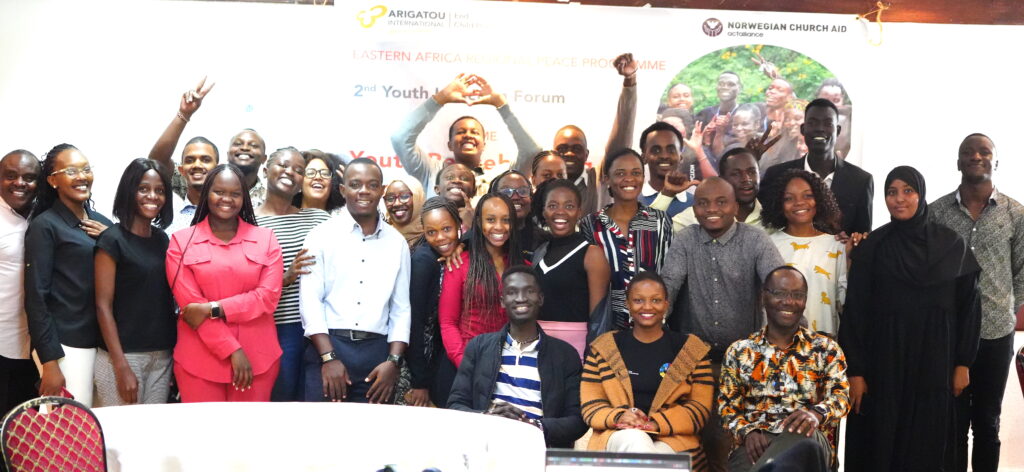
Often, youth lobby for more access to decision making positions and leadership as a step to transforming their role in conflict while neglecting deeper and more meaningful engagement on issues such as economic development and resource governance that would facilitate broader youth development and long-term peace.
It is within this premise that we conceptualized and held the 6thYouth In Action (the second forum under the new cohort) forum in Nairobi, Kenya, from 20th – 24th May 2023. The forum brought together 25 diverse young leaders from 5 countries (Ethiopia, Kenya, South Sudan, Tanzania, and Uganda) discussing the intersection between peacebuilding and youth economic development with an anchor on Freedom of Religion or Belief (FoRB).
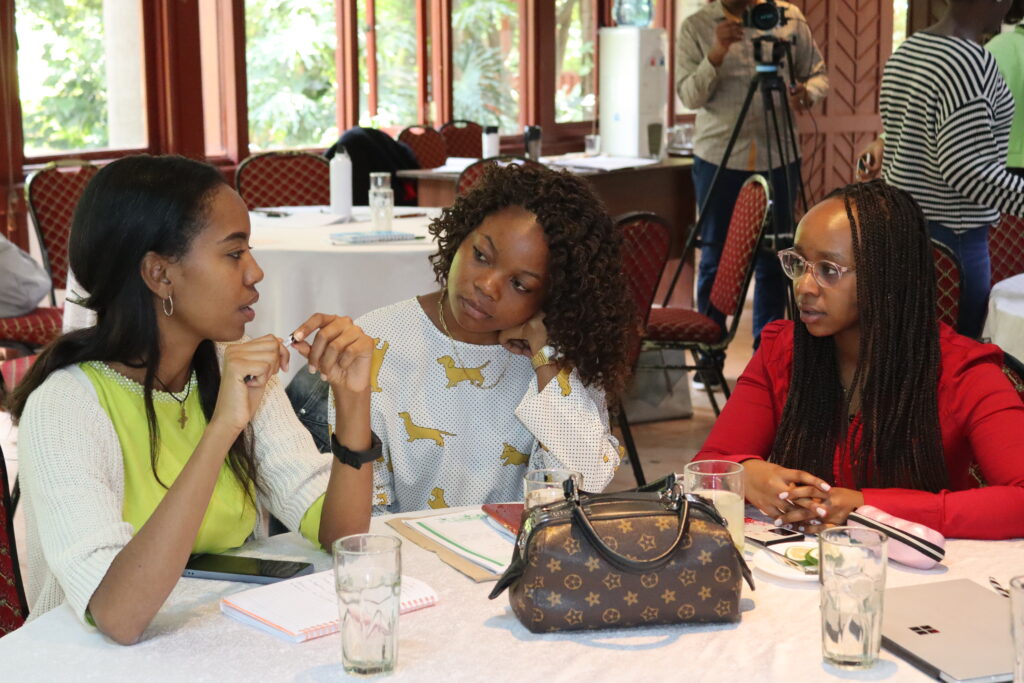
While introducing the 6th Youth In Action, Fred Nyabera, Director of Arigatou International – End Child Poverty lauded the young people for their understanding of FoRB, awareness of issues around FoRB including violation and their proactiveness on social media talking about FoRB. He challenged them to be champions of FoRB think about FoRB as an enabler for peace and a prerequisite for economic development.
“You are not here by accident; you were selected because of your influence as young leaders. You need to stretch your boundaries in thinking about FoRB” he emphasized.
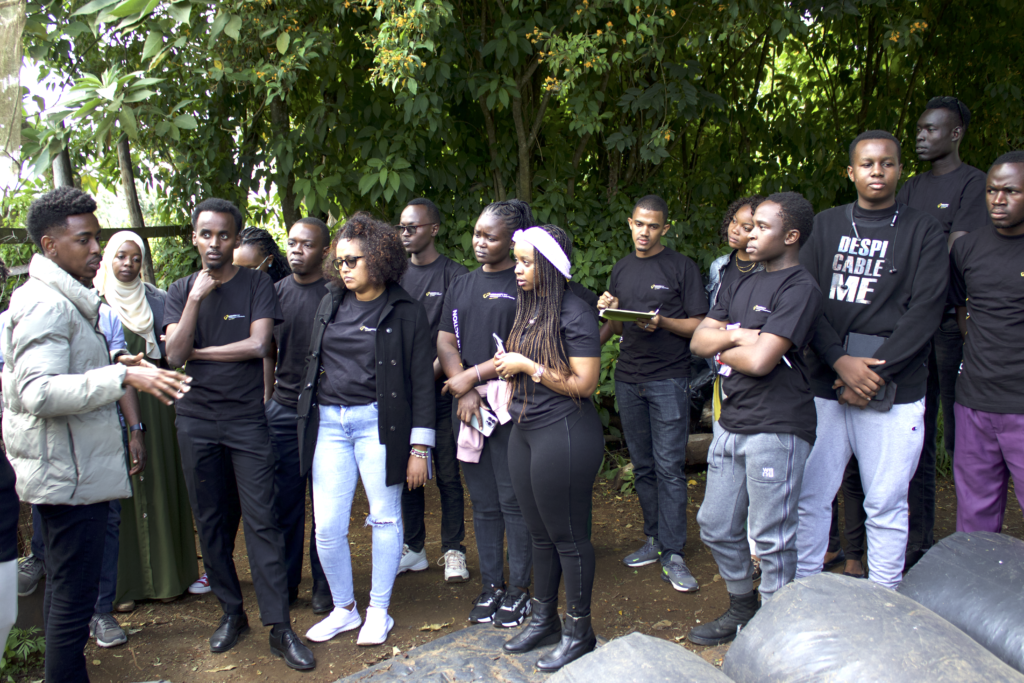
In a bid to practically learn and experience youth economic development, the 25 young people interacted with Tetu farm (a dairy farm ran by young people) and EcoBana (a youth initiative producing eco friendly sanitary pads). This was in a field visit organized by the SDGs Academy for Children, in Limuru, Kenya. Through this experience, the youth were challenged to come up with initiatives and take actions towards economic development by using technology and available resources.
“Don’t work in silos, look for strategic partnerships and use what you have to get what you don’t have” echoed Grace, one of the young people after an exciting experience with young entrepreneurs.
Lennox Omondi, young leader at EcoBana challenged his peers to be innovative even within existing spaces and products in order to find their niche; giving example of their unique sanitary pads made from banana fibers.
“You don’t always have to come up with new solutions to problems. Instead, you can work to improve on existing solutions” Lennox Omondi.
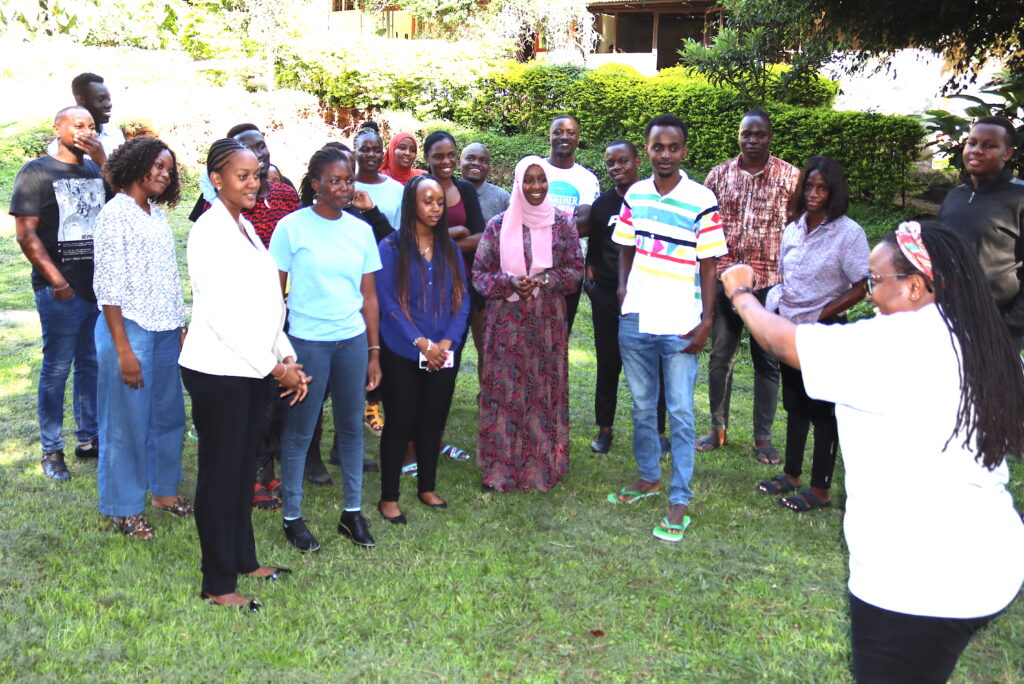
While linking this field experience to FoRB and peacebuilding, Michael Adikwu, the Sustainable Development programme lead at End Child Poverty underscored that FoRB and youth economic development related to peace, adding that for development to happen, there has tom be peace and people have to live in harmony irrespective of their religious background. Michael urged the youth to be creative and meaningfully use technology in efforts to stir up development.
“The same technology used to cause or perpetuate violence can be used for sustainability and development” he emphasized.
In her closing remarks, Maria Osula, manager of the Norwegian Church Aid Eastern Regional Peace Programme (under which Youth In Action is convened) also urged the youth to be creative and impactful in their actions towards peacebuilding.
“I have faced many challenges working on peacebuilding but what motivates me to continue each morning is hearing from different people that I have made a difference in their lives”, she gave an example of herself. The 3-day forum was undoubtedly a unique opportunity to tap into the different experiences of young people in peace building and economic development as well as inspire youth to reflect on opportunities that exist regarding increasing their sources of livelihood and diversifying conflict resolution. This way, the forum positioned itself as an exceptional platform for youth peacebuilding.
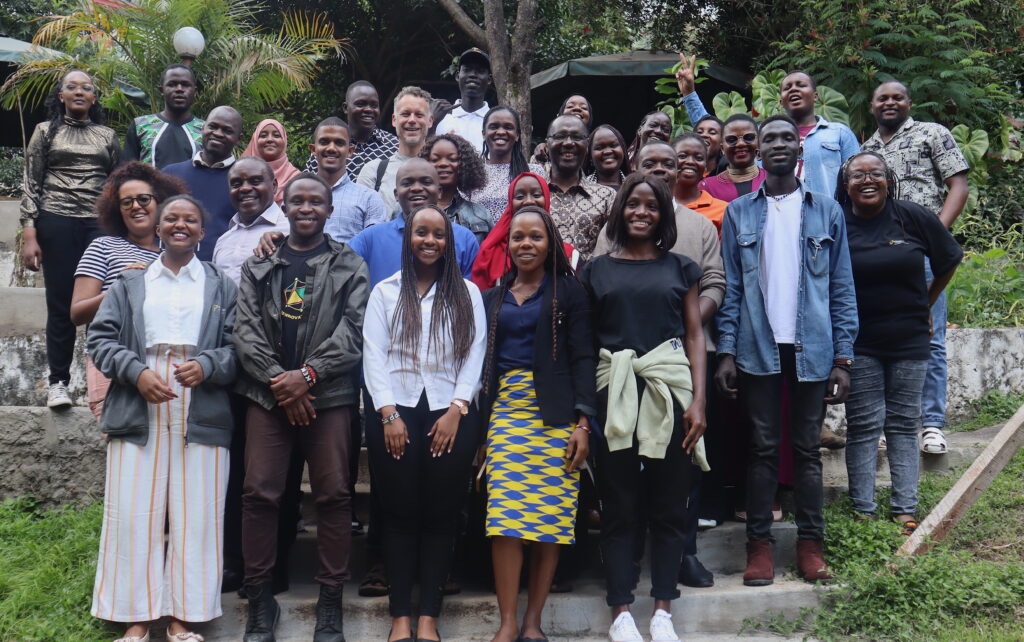
The post Youth Economic Development and Peacebuilding appeared first on End Child Poverty.
The post Youth Economic Development and Peacebuilding appeared first on Arigatou International.
03/05/2023 - The SDGs Academy at the Africa Children Summit

The inaugural Africa Children Summit was not just an ‘attend and go’ summit. It was a platform for children and partnering organization to showcase their work, creativity, and solutions towards creating a better world for children.
With the budding SDGs Academy for Children, Arigatou International could ill-afford to miss this opportunity to promote it’s through the SDGs Academy for Children.
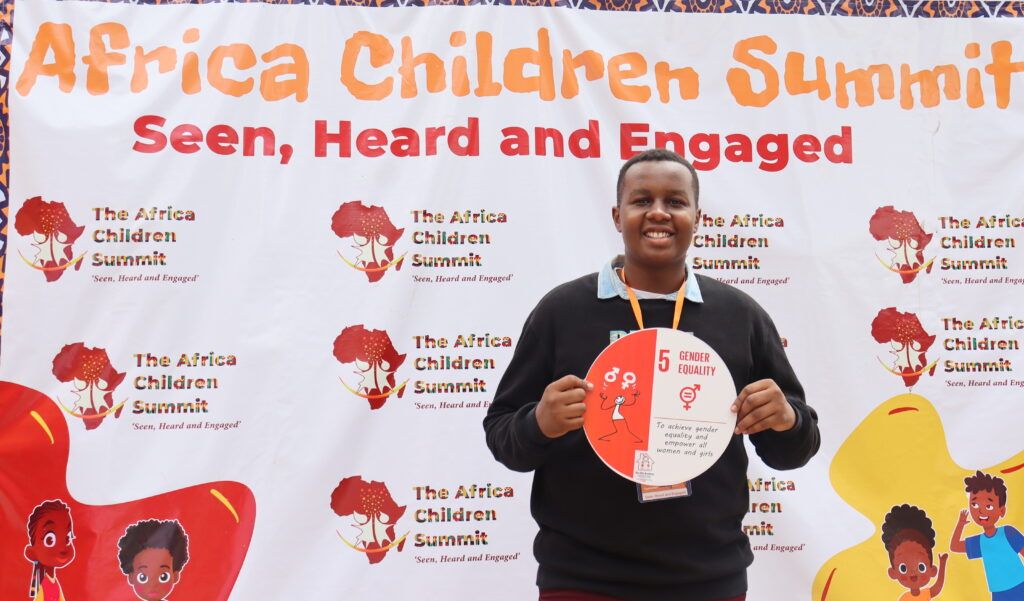
At the summit, we established a child-friendly innovations hub, which took a miniature form of the physical hub of the Academy, complete with the 5 hubs (Knowledge, Dialogue, Capacity, Faith and Fun, Innovations and Solutions) equipped with informative materials corresponding to the hubs.
The innovation hub served not only to portray how a physical space of the Academy looks like but also took participants (both children and adults) through an overview of Arigatou International and what it does with a specific focus on the SDGs Academy for Children.
In droves as well as in their numbers, children as well as adults frequented the innovations space as they were moved by the amazing story and model of the Academy and the breathtaking set up of the space. Further, the array of SDGs related informative materials as well as fun and media related resources pulled participants to the space, with most of them visibly posing for photos with their favorite SDGs, designed as posters.
“It’s very important that as children we start working on the SDGs as soon as possible because they are actually meant for a better future for children. The SDGs should actually be part of our curriculum” Brian, Child, Kenya.
The innovation space further served as hosting space for breakout sessions during the summit, one of which was one media and technology. Children in the session called for the need to have their parents, caregivers and teachers enlightened more on media and technology with regards to best ways to keep children safe on online spaces as well as support them meaningfully use such spaces to learn.
Aside from the innovation hub, we set up a booth through which participants got a first-hand brief about the SDGs Academy for Children among other key areas of Arigatou International.
As we accelerate efforts in promoting the Academy and cementing its footprints and imprints, the Africa Children Summit provided a huge platform towards entrenching the Academy as one of the available meaningful children participation spaces; with the Academy focused on providing a safe space and programme for children’s participation, learning and action on the Sustainable Development Goals (SDGs), and the Agenda 2030 in general.
Arigatou International was one of the 23 partnering organizations for the Africa Children Summit and presented the SDGs Academy for Children as a safe space for children to participate in coming up with solutions to create a better world around them.
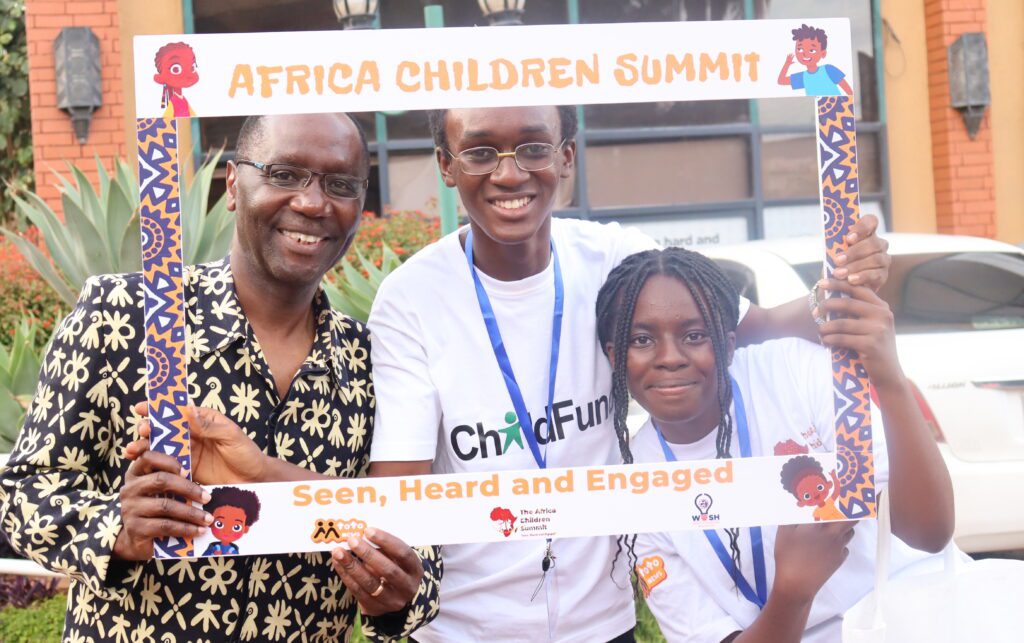
“We at Arigatou International are excited to see the outcomes of this summit, and the impact that your ideas and actions will have on Africa and the world, and we are committed to support your efforts in any way we can – especially though our Arigatou SDGs Academy for Children” expressed Fred Nyabera, Director, Arigatou International – End Child Poverty.
The post The SDGs Academy at the Africa Children Summit appeared first on End Child Poverty.
The post The SDGs Academy at the Africa Children Summit appeared first on Arigatou International.
03/05/2023 - The SDGs Academy at the Africa Children Summit

The inaugural Africa Children Summit was not just an ‘attend and go’ summit. It was a platform for children and partnering organization to showcase their work, creativity, and solutions towards creating a better world for children.
With the budding SDGs Academy for Children, Arigatou International could ill-afford to miss this opportunity to promote it’s through the SDGs Academy for Children.

At the summit, we established a child-friendly innovations hub, which took a miniature form of the physical hub of the Academy, complete with the 5 hubs (Knowledge, Dialogue, Capacity, Faith and Fun, Innovations and Solutions) equipped with informative materials corresponding to the hubs.
The innovation hub served not only to portray how a physical space of the Academy looks like but also took participants (both children and adults) through an overview of Arigatou International and what it does with a specific focus on the SDGs Academy for Children.
In droves as well as in their numbers, children as well as adults frequented the innovations space as they were moved by the amazing story and model of the Academy and the breathtaking set up of the space. Further, the array of SDGs related informative materials as well as fun and media related resources pulled participants to the space, with most of them visibly posing for photos with their favorite SDGs, designed as posters.
“It’s very important that as children we start working on the SDGs as soon as possible because they are actually meant for a better future for children. The SDGs should actually be part of our curriculum” Brian, Child, Kenya.
The innovation space further served as hosting space for breakout sessions during the summit, one of which was one media and technology. Children in the session called for the need to have their parents, caregivers and teachers enlightened more on media and technology with regards to best ways to keep children safe on online spaces as well as support them meaningfully use such spaces to learn.
Aside from the innovation hub, we set up a booth through which participants got a first-hand brief about the SDGs Academy for Children among other key areas of Arigatou International.
As we accelerate efforts in promoting the Academy and cementing its footprints and imprints, the Africa Children Summit provided a huge platform towards entrenching the Academy as one of the available meaningful children participation spaces; with the Academy focused on providing a safe space and programme for children’s participation, learning and action on the Sustainable Development Goals (SDGs), and the Agenda 2030 in general.
Arigatou International was one of the 23 partnering organizations for the Africa Children Summit and presented the SDGs Academy for Children as a safe space for children to participate in coming up with solutions to create a better world around them.

“We at Arigatou International are excited to see the outcomes of this summit, and the impact that your ideas and actions will have on Africa and the world, and we are committed to support your efforts in any way we can – especially though our Arigatou SDGs Academy for Children” expressed Fred Nyabera, Director, Arigatou International – End Child Poverty.
The post The SDGs Academy at the Africa Children Summit appeared first on End Child Poverty.
The post The SDGs Academy at the Africa Children Summit appeared first on Arigatou International.
02/05/2023 - A Space Designed by Children, for Children to be Seen, Heard, and Engaged
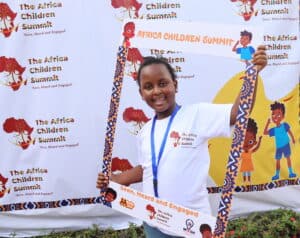
Have you ever attended a forum, session, workshop, or conversation where children are in charge? Chances are, you have not experienced this often or even at all. The inaugural Africa Children Summit, which took place in Nairobi, Kenya from 10th – 12th April, was such unique space entirely designed for and by children to be “Seen, Heard and Engaged”.
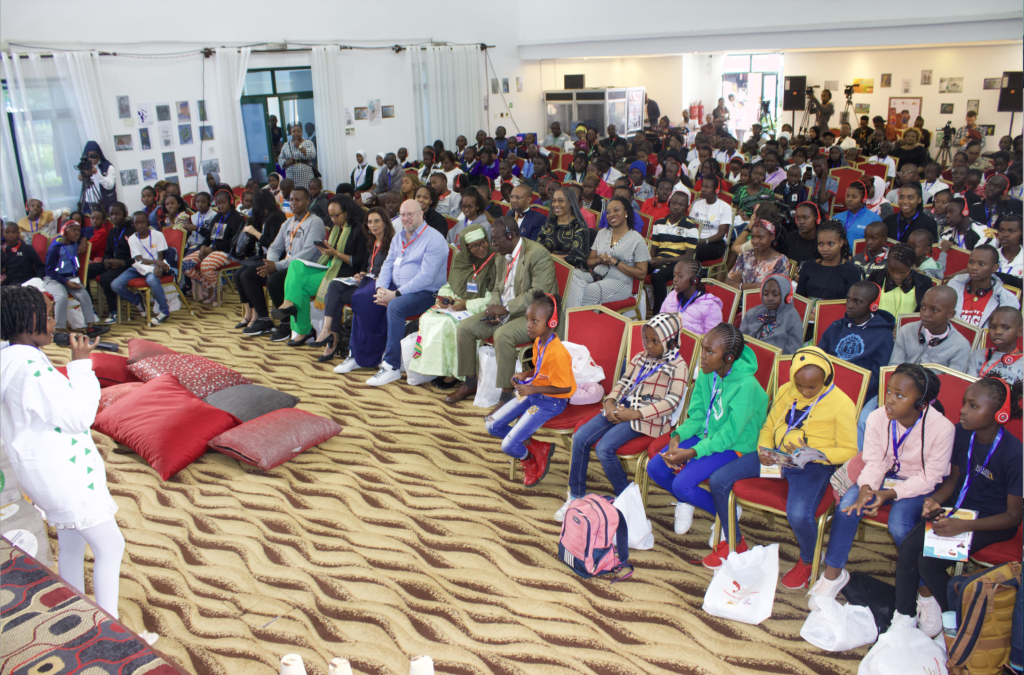
The summit was conceptualized, planned and facilitated by children from across Africa, culminating in a 3-day event that brought together over 250 in-person participants from 9 countries (Mali, Kenya, Rwanda, Sierra Leone, South Africa, Tanzania, Uganda, Zambia and Zimbabwe), and up to 700 virtual participants from a host of countries across Africa and beyond.
“If it is indeed our day then we should participate in organizing it, determining the theme, and working with adults to ensure it is genuinely our day!” expressed Omar, a 17-year-old from Kenya.
Children discussed pertinent matters concerning them, such as education, climate change, violence against children, online child protection, and health, with policy makers and parents/caregivers. They called on governments and other stakeholders to provide sufficient funding and facilities for schools, with special attention to physically challenged children, and emphasized the need to have education available, acceptable, adaptable and equal across Africa.
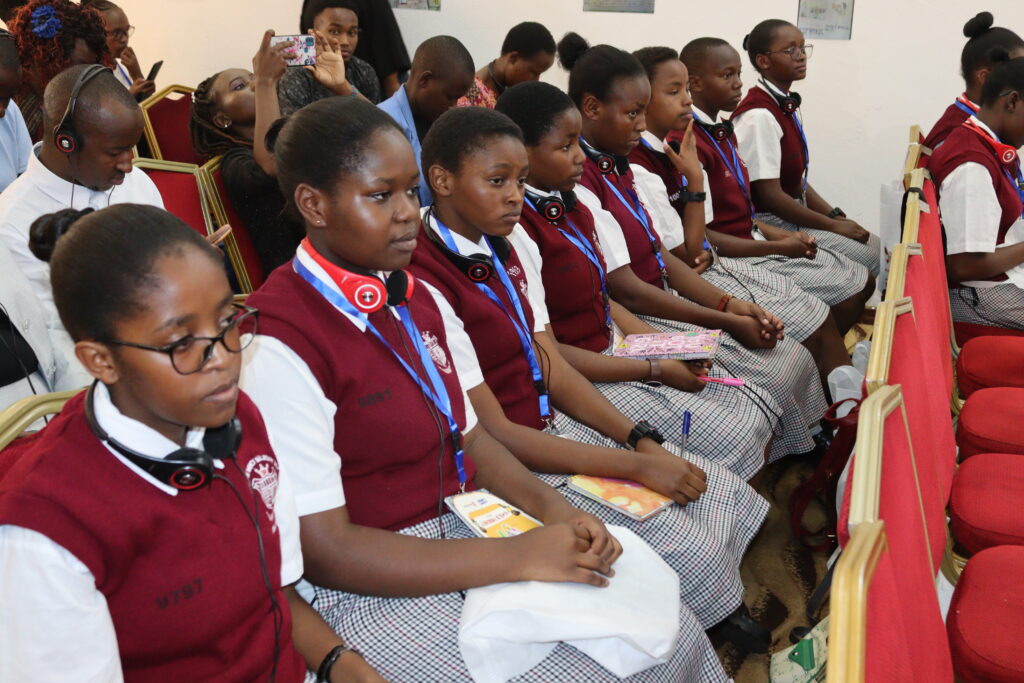
“We need to have gender equality when providing education to all children” expressed Francine, a 16-year-old from Zambia.
Margarate, a child from South Africa, emphasized the need for safe online spaces for children to learn and interact. This echoes the call made by others who advocate for policies and measures to protect children online, rather than discouraging them from using or engaging with online platforms. These advocates point to the essential role that online spaces played in facilitating virtual learning during the COVID-19 pandemic lockdown period, and urge society to prioritize the creation of safe online environments for children.
During a side event focused on ending violence against children, Dr. Najat Maalla, the United Nations Special Representative on Violence Against Children, discussed the issue with attendees. At the event, children expressed their regret that violence against them is still prevalent, even in what should be safe spaces such as homes and schools.
Upendo, a child from Kenya, highlighted that emotional violence can be just as damaging as physical violence and stressed the need for emotional and psychological care.
Dr. Najat contributed to the discussion by revealing that violence against children was a widespread issue that involves harmful cultural practices still present in Africa. She emphasized the need for a comprehensive approach to addressing this problem, one that involves empowering and involving children, communities, religious and traditional leaders in advocating for change and monitoring the actions of governments.
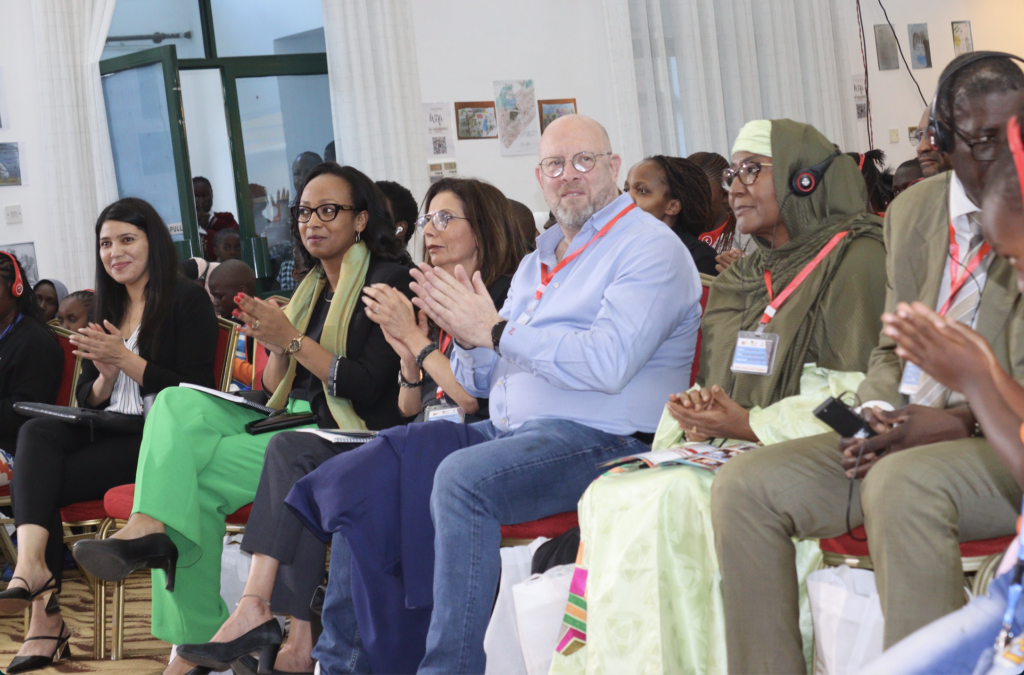
Contributing to this subject was Dr. Mustafa Y. Ali; Secretary General of Arigatou International’s Global Network of Religions for Children (GNRC) who shared that Arigatou International uses religion as a resource to focus on the challenges and practices that undermine, and promote the rights of children.
The children highlighted that violence among them was still rampant, even in what are supposed to be safe spaces for them like homes and schools. They stressed the need for emotional and psychological care, and for policies and measures to be put in place to address violence against children broadly.
Arigatou International was one of the 23 partnering organizations for the Africa Children Summit and presented the SDGs Academy for Children as a safe space for children to participate in coming up with solutions to create a better world around them.
“We at Arigatou International are excited to see the outcomes of this summit, and the impact that your ideas and actions will have on Africa and the world, and we are committed to support your efforts in any way we can – especially though our Arigatou SDGs Academy for Children” expressed Fred Nyabera, Director, Arigatou International – End Child Poverty. The summit concluded with children handing over a position paper with recommendations to policy makers and government officials. The recommendations highlighted key action areas on the thematic areas discussed by children in the summit.
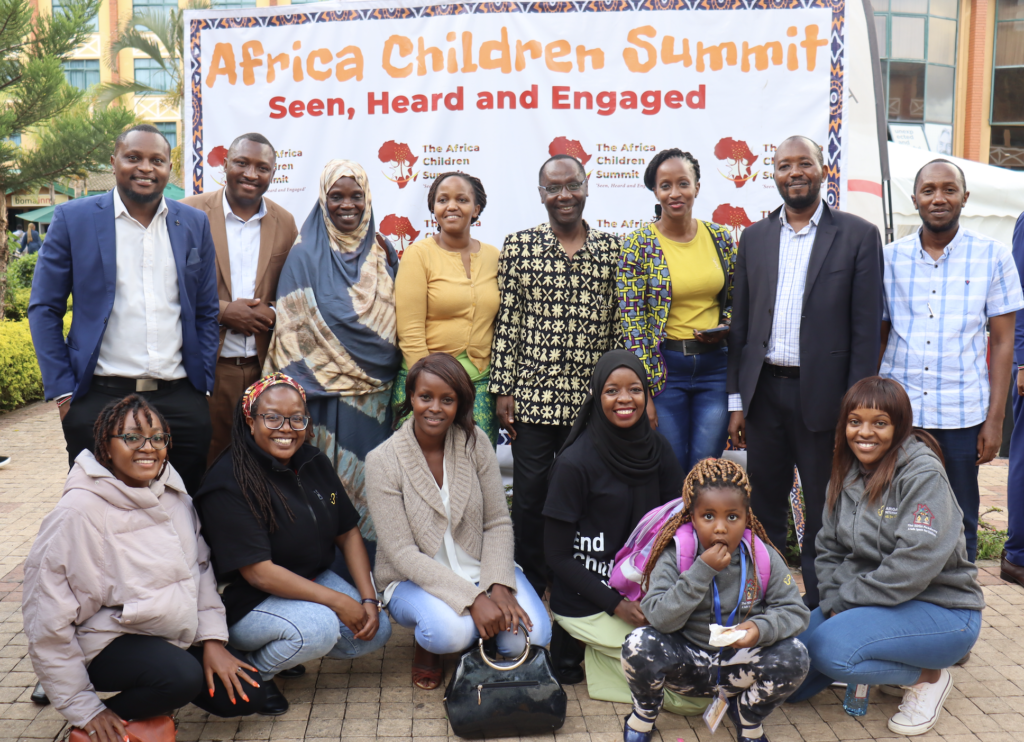
The post A Space Designed by Children, for Children to be Seen, Heard, and Engaged appeared first on End Child Poverty.
The post A Space Designed by Children, for Children to be Seen, Heard, and Engaged appeared first on Arigatou International.
02/05/2023 - A Space Designed by Children, for Children to be Seen, Heard, and Engaged

Have you ever attended a forum, session, workshop, or conversation where children are in charge? Chances are, you have not experienced this often or even at all. The inaugural Africa Children Summit, which took place in Nairobi, Kenya from 10th – 12th April, was such unique space entirely designed for and by children to be “Seen, Heard and Engaged”.

The summit was conceptualized, planned and facilitated by children from across Africa, culminating in a 3-day event that brought together over 250 in-person participants from 9 countries (Mali, Kenya, Rwanda, Sierra Leone, South Africa, Tanzania, Uganda, Zambia and Zimbabwe), and up to 700 virtual participants from a host of countries across Africa and beyond.
“If it is indeed our day then we should participate in organizing it, determining the theme, and working with adults to ensure it is genuinely our day!” expressed Omar, a 17-year-old from Kenya.
Children discussed pertinent matters concerning them, such as education, climate change, violence against children, online child protection, and health, with policy makers and parents/caregivers. They called on governments and other stakeholders to provide sufficient funding and facilities for schools, with special attention to physically challenged children, and emphasized the need to have education available, acceptable, adaptable and equal across Africa.

“We need to have gender equality when providing education to all children” expressed Francine, a 16-year-old from Zambia.
Margarate, a child from South Africa, emphasized the need for safe online spaces for children to learn and interact. This echoes the call made by others who advocate for policies and measures to protect children online, rather than discouraging them from using or engaging with online platforms. These advocates point to the essential role that online spaces played in facilitating virtual learning during the COVID-19 pandemic lockdown period, and urge society to prioritize the creation of safe online environments for children.
During a side event focused on ending violence against children, Dr. Najat Maalla, the United Nations Special Representative on Violence Against Children, discussed the issue with attendees. At the event, children expressed their regret that violence against them is still prevalent, even in what should be safe spaces such as homes and schools.
Upendo, a child from Kenya, highlighted that emotional violence can be just as damaging as physical violence and stressed the need for emotional and psychological care.
Dr. Najat contributed to the discussion by revealing that violence against children was a widespread issue that involves harmful cultural practices still present in Africa. She emphasized the need for a comprehensive approach to addressing this problem, one that involves empowering and involving children, communities, religious and traditional leaders in advocating for change and monitoring the actions of governments.

Contributing to this subject was Dr. Mustafa Y. Ali; Secretary General of Arigatou International’s Global Network of Religions for Children (GNRC) who shared that Arigatou International uses religion as a resource to focus on the challenges and practices that undermine, and promote the rights of children.
The children highlighted that violence among them was still rampant, even in what are supposed to be safe spaces for them like homes and schools. They stressed the need for emotional and psychological care, and for policies and measures to be put in place to address violence against children broadly.
Arigatou International was one of the 23 partnering organizations for the Africa Children Summit and presented the SDGs Academy for Children as a safe space for children to participate in coming up with solutions to create a better world around them.
“We at Arigatou International are excited to see the outcomes of this summit, and the impact that your ideas and actions will have on Africa and the world, and we are committed to support your efforts in any way we can – especially though our Arigatou SDGs Academy for Children” expressed Fred Nyabera, Director, Arigatou International – End Child Poverty. The summit concluded with children handing over a position paper with recommendations to policy makers and government officials. The recommendations highlighted key action areas on the thematic areas discussed by children in the summit.

The post A Space Designed by Children, for Children to be Seen, Heard, and Engaged appeared first on End Child Poverty.
The post A Space Designed by Children, for Children to be Seen, Heard, and Engaged appeared first on Arigatou International.
15/03/2023 - Robotics for Sustainable Development
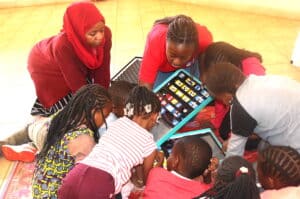
Science, Technology, Engineering, and Mathematics (STEM) are central to accelerating achievement of United Nations Agenda 2030 and particularly the Sustainable Development Goals (SDGs). The UN recognizes technology as a cross-cutting ‘means of implementation,’ underpinning the achievement of every goal.
Recognizing the centrality of STEM, the Arigatou International SDGs Academy for Children in partnership with the Kenya Flying Labs facilitated a 3-part learning series on Robotics and Sustainable Development. This learning sessions involved 27 children accompanied with parents, caregivers, and teachers at the Academy’s physical hub in Limuru, Kenya.
The learning sessions used the Twin Science Curriculum by WeRobotics to introduce the children to robotics, life sciences, coding and how they could develop robots to aid in actions towards implementing the SDGs.
“I have learnt that robotics is important in our lives; for example, in treating patients in hospitals” Jonathan, 10-year-old participant.
Throughout the sessions, children were enlightened on how science and technology was important towards achieving the SDGs and how they could use available technology and through knowledge gained to contribute to that achievement.
Activities during the learning and practical sessions involved building knowledge about robotics as part of STEM, how to make robots, how they work, coding and operating household robots and drones. Extra learning activities like outdoor games and watching movies such as “the boy who harnessed the wind” to discuss SDGs 1 (No Poverty), 2 (Zero Hunger), 4 (Quality Education), 6 (Clean Water & Sanitation), 7 (Clean and Affordable Energy), and 13 (Climate Action) further made it easier and fascinating in entrenching the skills gained with regards to actualizing the SDGs.
“The SDGs Academy for Children prides in providing a safe space for children in building a sustainably developed worlds for all children” Michael Adikwu, Lead, SDGs Academy for Children, Arigatou International.
The Arigatou International SDGs Academy for Children uses the Global Development Education (GDE) and Transformative Pedagogy methods to deliver learning, skills and practical actions for children to internalize and contribute towards implementation of the SDGs.
Prior to this 3-part learning sessions, we have been partnering with the Kenya Flying Labs in delivering similar tech-oriented trainings for children at the Academy. We are also partnering with the Kenya Flying Labs in establishing SDGs Clubs in schools in Kenya.
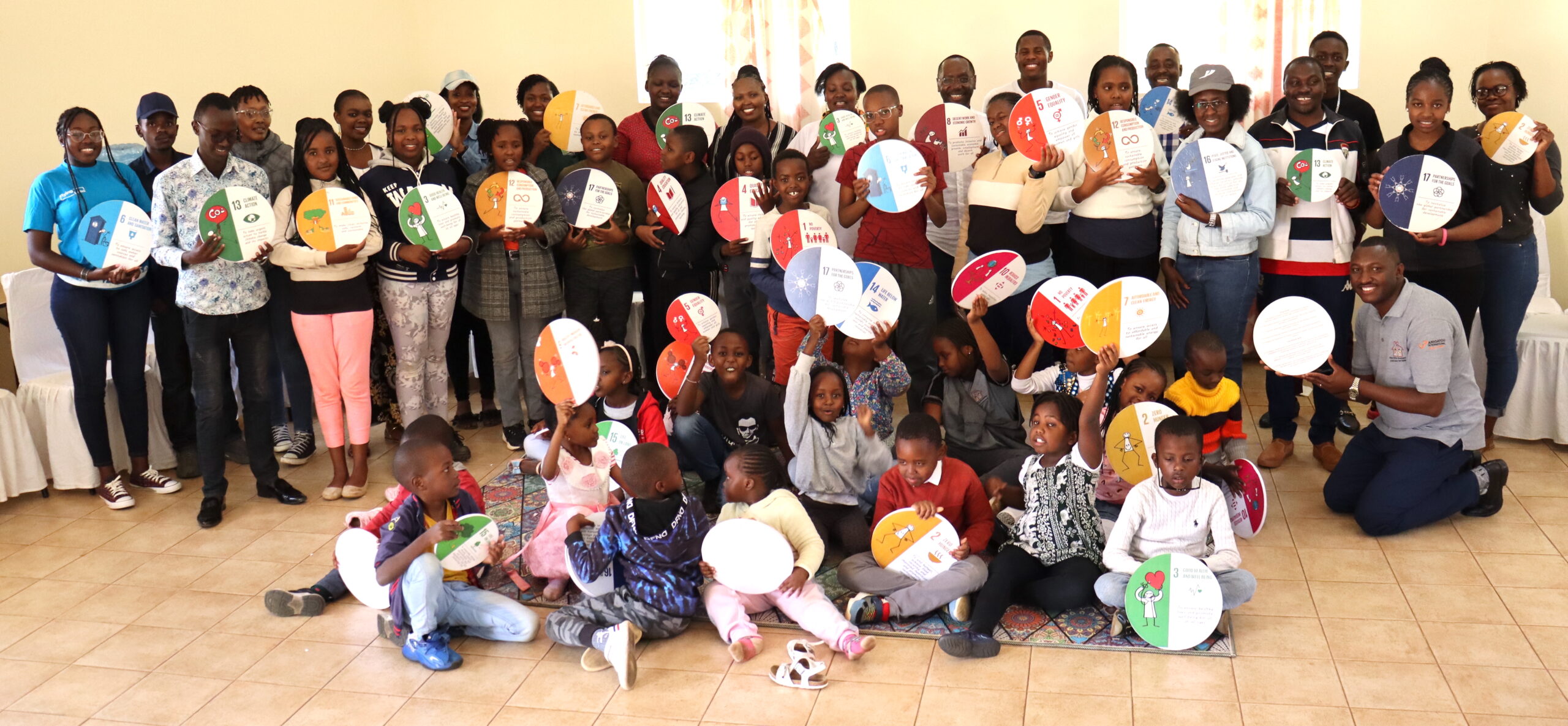
The post <strong>Robotics for Sustainable Development</strong> appeared first on End Child Poverty.
The post Robotics for Sustainable Development appeared first on Arigatou International.
15/03/2023 - Robotics for Sustainable Development

Science, Technology, Engineering, and Mathematics (STEM) are central to accelerating achievement of United Nations Agenda 2030 and particularly the Sustainable Development Goals (SDGs). The UN recognizes technology as a cross-cutting ‘means of implementation,’ underpinning the achievement of every goal.
Recognizing the centrality of STEM, the Arigatou International SDGs Academy for Children in partnership with the Kenya Flying Labs facilitated a 3-part learning series on Robotics and Sustainable Development. This learning sessions involved 27 children accompanied with parents, caregivers, and teachers at the Academy’s physical hub in Limuru, Kenya.
The learning sessions used the Twin Science Curriculum by WeRobotics to introduce the children to robotics, life sciences, coding and how they could develop robots to aid in actions towards implementing the SDGs.
“I have learnt that robotics is important in our lives; for example, in treating patients in hospitals” Jonathan, 10-year-old participant.
Throughout the sessions, children were enlightened on how science and technology was important towards achieving the SDGs and how they could use available technology and through knowledge gained to contribute to that achievement.
Activities during the learning and practical sessions involved building knowledge about robotics as part of STEM, how to make robots, how they work, coding and operating household robots and drones. Extra learning activities like outdoor games and watching movies such as “the boy who harnessed the wind” to discuss SDGs 1 (No Poverty), 2 (Zero Hunger), 4 (Quality Education), 6 (Clean Water & Sanitation), 7 (Clean and Affordable Energy), and 13 (Climate Action) further made it easier and fascinating in entrenching the skills gained with regards to actualizing the SDGs.
“The SDGs Academy for Children prides in providing a safe space for children in building a sustainably developed worlds for all children” Michael Adikwu, Lead, SDGs Academy for Children, Arigatou International.
The Arigatou International SDGs Academy for Children uses the Global Development Education (GDE) and Transformative Pedagogy methods to deliver learning, skills and practical actions for children to internalize and contribute towards implementation of the SDGs.
Prior to this 3-part learning sessions, we have been partnering with the Kenya Flying Labs in delivering similar tech-oriented trainings for children at the Academy. We are also partnering with the Kenya Flying Labs in establishing SDGs Clubs in schools in Kenya.

The post <strong>Robotics for Sustainable Development</strong> appeared first on End Child Poverty.
The post Robotics for Sustainable Development appeared first on Arigatou International.
08/03/2023 - Young women leading innovative solutions to overcome child poverty.
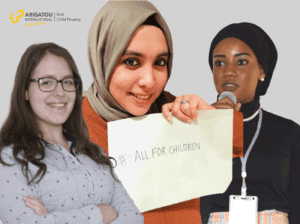
Every year, the world commemorates the International Women’s Day (March 8) to recognise the achievements and contribution of women towards creating a better world. Today, the world is faced with a multiplicity of crises, and this only calls for inclusive approaches towards addressing these crises, including child poverty.
Recognising the vital role they play in securing children’s wellbeing and dignity, we work with women leaders from diverse contexts towards creating a world free of child poverty. These women lead and promote innovative solutions aimed at addressing the root causes of child poverty.
In celebrating this year’s International Women’s Day, we cast a spotlight on three young women at the forefront of such innovative solutions to address child poverty.
Shazmin Rafeeq, I CAN Malaysia
Shazmin’s leadership: A community centre to serve children, particularly Rohingya children living as refugees in Kuala Lumpur, Malaysia.
I CAN Malaysia (founded by Shazmin) established a community learning center – the Darul eslah Academy – that provides basic nutrition, non-formal and social skills education to the children living as refugees, as well as volunteer opportunities for university students and other members of the community. Further, I CAN Malaysia, collaborates with several Madrassas to provide psycho-social support to the children, in addition to religious education and nurturing spirituality and positive values. Shazmin has been instrumental in leading these processes and working with other young people to act.
“We believe in the philosophy “Give a man a fish, and you feed him for a day; show him how to catch fish, and you feed him for a lifetime.” The focus of ICAN Malaysia is not only to help people living in or affected by poverty with their basic needs; but also to make them self-reliant by providing required training and guidance accordingly. Instead of considering poor people as burden or liability for the society, with our help, training, assistance and guidance each individual can start contributing to the society in every aspect.”
Zvonmira Jakić, GNRC (Global Network of Religions for Children) Bosnia and Herzegovina
Zvonmira’s leadership: Advocacy and social entrepreneurship.
Zvonimira Jakić is the youth coordinator for the Global Network of Religions for Children (GNRC) in Bosnia and Herzegovina and a youth advisor of the Presidency of Bosnia and Herzegovina, among other key leadership roles. Zvonmira is also a champion of promoting children’s education, forming a global program for tutoring for children in vulenrable circumstances. A receipient of the 2019 SEEBA “Best Young Entrepreneur” Award for the startup “Green Solutions” for innovation in agriculture digitalization, Zvonmira’s work epitomizes this year’s International Women’s Day theme, “DigitALL: Innovation and Technology for Gender Equality.”
“Changemaker (is) the word which explains me the best … I am mentoring several university and high school students around the globe (focusing) on Bosnia and Herzegovina, where I teach and mentor them to become future leaders and changemakers of the world. My motto for change and work is: “INSPIRE.ACT.CHANGE!” … My biggest success is when I see that one of my students made a positive CHANGE in the globe.”
*Zvonmira’s quote is from an interview with the European Democracy Youth Network (EYDN). Read Zvonmira’s full interview ‘Everyday Heros’ responses by the EYDN, here
Haoua Dicko, REJADH (Réseau des Enfants et Jeunes Africains pour les Droits Humains), Mali
Haoua’s leadership: Community mobilisation and youth-led advocacy for human rights and addressing gender-based violence (GBV)
Haoua has been part of the leadership of the REJADH network, spearheading grassroots advocacy work in Mali. REJADH (African Children and Youth Network for Human Rights/Réseau des Enfants et Jeunes Africains pour les Droits Humains) was established as a platform for advocacy by and for young people from 5 countries (Burundi, the Democratic Republic of Congo (DRC), Mali, South Sudan and Somalia) often affected by conflict, poverty, and Gender-Based Violence (GBV). Through this program, we sought to empower young leaders (youth, youth influencers, and young adults) with the necessary skills to help them reduce, prevent, and end gender-based violence and its negative effects on young people and the community at large. Since inception, REJADH has reached more than 5,000 children and youth through direct advocacy efforts. Similarly, its online reach has been overwhelming through the REJADH social media spaces.
“As a member of REJADH since its creation in October 2016 in Addis Ababa, Ethiopia, I can say that REJADH has had a very positive impact in my life, starting with this feeling of being useful in my community. I am now able to serve as a positive example and role model for other young Africans, and more particularly for my Malian brothers and sisters. I am committed to living with a lot of devotion and contribute more to the development of my continent. I believe this piece of wisdom, “the man who fights for others is better than the one who fights for himself”. The fight continues until it succeeds.
Happy International Women’s Day!
The post <strong>Young women leading innovative solutions to overcome child poverty.</strong> appeared first on End Child Poverty.
The post Young women leading innovative solutions to overcome child poverty. appeared first on Arigatou International.
08/03/2023 - Young women leading innovative solutions to overcome child poverty.

Every year, the world commemorates the International Women’s Day (March 8) to recognise the achievements and contribution of women towards creating a better world. Today, the world is faced with a multiplicity of crises, and this only calls for inclusive approaches towards addressing these crises, including child poverty.
Recognising the vital role they play in securing children’s wellbeing and dignity, we work with women leaders from diverse contexts towards creating a world free of child poverty. These women lead and promote innovative solutions aimed at addressing the root causes of child poverty.
In celebrating this year’s International Women’s Day, we cast a spotlight on three young women at the forefront of such innovative solutions to address child poverty.
Shazmin Rafeeq, I CAN Malaysia
Shazmin’s leadership: A community centre to serve children, particularly Rohingya children living as refugees in Kuala Lumpur, Malaysia.
I CAN Malaysia (founded by Shazmin) established a community learning center – the Darul eslah Academy – that provides basic nutrition, non-formal and social skills education to the children living as refugees, as well as volunteer opportunities for university students and other members of the community. Further, I CAN Malaysia, collaborates with several Madrassas to provide psycho-social support to the children, in addition to religious education and nurturing spirituality and positive values. Shazmin has been instrumental in leading these processes and working with other young people to act.
“We believe in the philosophy “Give a man a fish, and you feed him for a day; show him how to catch fish, and you feed him for a lifetime.” The focus of ICAN Malaysia is not only to help people living in or affected by poverty with their basic needs; but also to make them self-reliant by providing required training and guidance accordingly. Instead of considering poor people as burden or liability for the society, with our help, training, assistance and guidance each individual can start contributing to the society in every aspect.”
Zvonmira Jakić, GNRC (Global Network of Religions for Children) Bosnia and Herzegovina
Zvonmira’s leadership: Advocacy and social entrepreneurship.
Zvonimira Jakić is the youth coordinator for the Global Network of Religions for Children (GNRC) in Bosnia and Herzegovina and a youth advisor of the Presidency of Bosnia and Herzegovina, among other key leadership roles. Zvonmira is also a champion of promoting children’s education, forming a global program for tutoring for children in vulenrable circumstances. A receipient of the 2019 SEEBA “Best Young Entrepreneur” Award for the startup “Green Solutions” for innovation in agriculture digitalization, Zvonmira’s work epitomizes this year’s International Women’s Day theme, “DigitALL: Innovation and Technology for Gender Equality.”
“Changemaker (is) the word which explains me the best … I am mentoring several university and high school students around the globe (focusing) on Bosnia and Herzegovina, where I teach and mentor them to become future leaders and changemakers of the world. My motto for change and work is: “INSPIRE.ACT.CHANGE!” … My biggest success is when I see that one of my students made a positive CHANGE in the globe.”
*Zvonmira’s quote is from an interview with the European Democracy Youth Network (EYDN). Read Zvonmira’s full interview ‘Everyday Heros’ responses by the EYDN, here
Haoua Dicko, REJADH (Réseau des Enfants et Jeunes Africains pour les Droits Humains), Mali
Haoua’s leadership: Community mobilisation and youth-led advocacy for human rights and addressing gender-based violence (GBV)
Haoua has been part of the leadership of the REJADH network, spearheading grassroots advocacy work in Mali. REJADH (African Children and Youth Network for Human Rights/Réseau des Enfants et Jeunes Africains pour les Droits Humains) was established as a platform for advocacy by and for young people from 5 countries (Burundi, the Democratic Republic of Congo (DRC), Mali, South Sudan and Somalia) often affected by conflict, poverty, and Gender-Based Violence (GBV). Through this program, we sought to empower young leaders (youth, youth influencers, and young adults) with the necessary skills to help them reduce, prevent, and end gender-based violence and its negative effects on young people and the community at large. Since inception, REJADH has reached more than 5,000 children and youth through direct advocacy efforts. Similarly, its online reach has been overwhelming through the REJADH social media spaces.
“As a member of REJADH since its creation in October 2016 in Addis Ababa, Ethiopia, I can say that REJADH has had a very positive impact in my life, starting with this feeling of being useful in my community. I am now able to serve as a positive example and role model for other young Africans, and more particularly for my Malian brothers and sisters. I am committed to living with a lot of devotion and contribute more to the development of my continent. I believe this piece of wisdom, “the man who fights for others is better than the one who fights for himself”. The fight continues until it succeeds.
Happy International Women’s Day!
The post <strong>Young women leading innovative solutions to overcome child poverty.</strong> appeared first on End Child Poverty.
The post Young women leading innovative solutions to overcome child poverty. appeared first on Arigatou International.
06/03/2023 - Our journey with Children Empowerment Centre – Meethotamulla, Sri Lanka
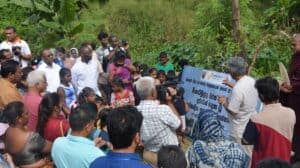
On the evening of Sinhala and Hindu New Year April 2014, it was a festive day for all Sri Lankans. The garbage dump collapsed in Meethotamulla, Kolonnawa., claiming 38 lives and 180 families were displaced and the affected provided with temporary shelter in Kolonnawa and nearby community centers.
The affected families were relocated into a housing scheme named “Sanhida Sewana” in Kolonnawa area. Most of the families had low-income levels and most families live in poverty. After the garbage collapse, the children’s lives in Meethotamulla became more challenging.
Perturbed by the conditions of these children especially the challenge with them receiving education, Arigatou International – End Child Poverty in collaboration with the Sarvodaya Shramadana Movement established an education center (also Children’s Empowerment Centre) in December 2018 during the “End Child Poverty and the Global Network of Religions for Children (GNRC) Southeast Asia Regional Meetings” in Sri Lanka.
Since inception, this center has been providing coaching classes for all children. There’s a growth in the number of children that join this class since some parents have seen a change in their children’s exam marks and interest in attending schools and shared their thoughts with other parents. Today, 50 Children attend coaching classes, and 4 voluntary teachers attend two days a week to teach these children. Subjects such as Mathematics, Sinhala, Tamil, English language and general knowledge classes are taught. As a result of the classes offered at the Centre, children from Meethotamulla have been passing their grade 5 exams and have gone to better schools within the district. Further, many students have passed the ordinary level exams and most of them have been selected to technical colleges.
The Children empowerment center will further support children until they complete their secondary education and will provide knowledge to children on essential life skills such as leadership skills, communication skills and critical thinking. There was established need to also teach the children some ethics education The voluntary teachers who visit for coaching classes also cover this kind of lesson for children’s well-being.
On January 21st, 2023, the End Child poverty Knowledge Center organized a small event and visited the center with voluntary teachers. The day was planned with fun-based activities, and storytelling to motivate children and let them understand the value of education. At the end of the session, stationaries were distributed among the children as an appreciation for receiving good marks in the school term exam last year and for continuously joining the classroom, In Sri Lanka’s economic crisis, exercise books and other stationery items price hiked, and these parents couldn’t afford them. The End child poverty Knowledge center is planning to establish a library for the children to borrow books weekly basis so it’ll not only help to improve their reading skills but will also let them see the world and understand the values that they should include in their lives. A change in a single child can lead to a change in many children.
The post Our journey with Children Empowerment Centre – Meethotamulla, Sri Lanka appeared first on End Child Poverty.
The post Our journey with Children Empowerment Centre – Meethotamulla, Sri Lanka appeared first on Arigatou International.
06/03/2023 - Our journey with Children Empowerment Centre – Meethotamulla, Sri Lanka

On the evening of Sinhala and Hindu New Year April 2014, it was a festive day for all Sri Lankans. The garbage dump collapsed in Meethotamulla, Kolonnawa., claiming 38 lives and 180 families were displaced and the affected provided with temporary shelter in Kolonnawa and nearby community centers.
The affected families were relocated into a housing scheme named “Sanhida Sewana” in Kolonnawa area. Most of the families had low-income levels and most families live in poverty. After the garbage collapse, the children’s lives in Meethotamulla became more challenging.
Perturbed by the conditions of these children especially the challenge with them receiving education, Arigatou International – End Child Poverty in collaboration with the Sarvodaya Shramadana Movement established an education center (also Children’s Empowerment Centre) in December 2018 during the “End Child Poverty and the Global Network of Religions for Children (GNRC) Southeast Asia Regional Meetings” in Sri Lanka.
Since inception, this center has been providing coaching classes for all children. There’s a growth in the number of children that join this class since some parents have seen a change in their children’s exam marks and interest in attending schools and shared their thoughts with other parents. Today, 50 Children attend coaching classes, and 4 voluntary teachers attend two days a week to teach these children. Subjects such as Mathematics, Sinhala, Tamil, English language and general knowledge classes are taught. As a result of the classes offered at the Centre, children from Meethotamulla have been passing their grade 5 exams and have gone to better schools within the district. Further, many students have passed the ordinary level exams and most of them have been selected to technical colleges.
The Children empowerment center will further support children until they complete their secondary education and will provide knowledge to children on essential life skills such as leadership skills, communication skills and critical thinking. There was established need to also teach the children some ethics education The voluntary teachers who visit for coaching classes also cover this kind of lesson for children’s well-being.
On January 21st, 2023, the End Child poverty Knowledge Center organized a small event and visited the center with voluntary teachers. The day was planned with fun-based activities, and storytelling to motivate children and let them understand the value of education. At the end of the session, stationaries were distributed among the children as an appreciation for receiving good marks in the school term exam last year and for continuously joining the classroom, In Sri Lanka’s economic crisis, exercise books and other stationery items price hiked, and these parents couldn’t afford them. The End child poverty Knowledge center is planning to establish a library for the children to borrow books weekly basis so it’ll not only help to improve their reading skills but will also let them see the world and understand the values that they should include in their lives. A change in a single child can lead to a change in many children.
The post Our journey with Children Empowerment Centre – Meethotamulla, Sri Lanka appeared first on End Child Poverty.
The post Our journey with Children Empowerment Centre – Meethotamulla, Sri Lanka appeared first on Arigatou International.
08/02/2023 - Socializing the SDGs among children in schools
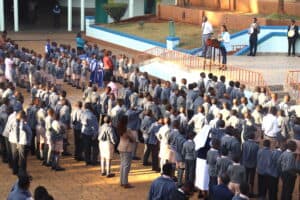
More than 500 students at St. Mary’s School Msongari, Nairobi were excited to learn about the Sustainable Development Goals (SDGs) and how they could be involved in achieving these global goals.
In a visit in the school on 6th February 202, we were honoured to interact with the students, sharing about the need to involve children in conversations and actions around the SDGs, through the SDGs club in the school.
Speaking to the students, the Executive Director of the Kenya SDGs Forum assured the students that their understanding of the SDGs would enable them contribute not only to the national development agenda but also to the global one; adding that achievement of the SDGs would make the world a better place for everyone.
Addressing the students at the morning assembly, the school Principal lauded the partnership and welcomed the idea of the SDGs club in the school, saying that it would enable the students to better understand the SDGs while contributing to their implementation. He also noted that knowledge on the SDGs would complement the students’ formal learning.
“SDGs clubs are safe spaces in schools for students to learn about the SDGs and take little but impactful actions within their context, just like the SDGs Academy for Children” Michael Adikwu, Lead, SDGs Academy for Children, Arigatou International.
This visit is part of a series of ongoing interventions with partners towards establishing SDGs clubs in schools. These clubs will be part of the greater partnership with the Arigatou International’s SDGs Academy for Children.
We are partnering with the SDGs Kenya Forum and the Kenya Flying Labs, to establish and equip the SDGs club at St. Mary’s School Msongari, Nairobi.
Arigatou International, through the SDGs academy for children believes that the best bet for a sustainable future is to teach children about the SDGs while they are young. The SDGs Academy aims to do this by providing children with simplified and easy-to-use learning tools on the SDGs. It will deliver this goal through the SDG model classroom for children that offer safe virtual and physical child-friendly spaces for interaction and exchange. Additionally, activities within the SDG Model classroom will involve a storytelling campaign for children on the SDGs, and multi-level gaming mobile applications and web apps that are relevant to children ages 4 and above.
The post <strong>Socializing the SDGs among children in schools</strong> appeared first on End Child Poverty.
The post Socializing the SDGs among children in schools appeared first on Arigatou International.
08/02/2023 - Socializing the SDGs among children in schools

More than 500 students at St. Mary’s School Msongari, Nairobi were excited to learn about the Sustainable Development Goals (SDGs) and how they could be involved in achieving these global goals.
In a visit in the school on 6th February 202, we were honoured to interact with the students, sharing about the need to involve children in conversations and actions around the SDGs, through the SDGs club in the school.
Speaking to the students, the Executive Director of the Kenya SDGs Forum assured the students that their understanding of the SDGs would enable them contribute not only to the national development agenda but also to the global one; adding that achievement of the SDGs would make the world a better place for everyone.
Addressing the students at the morning assembly, the school Principal lauded the partnership and welcomed the idea of the SDGs club in the school, saying that it would enable the students to better understand the SDGs while contributing to their implementation. He also noted that knowledge on the SDGs would complement the students’ formal learning.
“SDGs clubs are safe spaces in schools for students to learn about the SDGs and take little but impactful actions within their context, just like the SDGs Academy for Children” Michael Adikwu, Lead, SDGs Academy for Children, Arigatou International.
This visit is part of a series of ongoing interventions with partners towards establishing SDGs clubs in schools. These clubs will be part of the greater partnership with the Arigatou International’s SDGs Academy for Children.
We are partnering with the SDGs Kenya Forum and the Kenya Flying Labs, to establish and equip the SDGs club at St. Mary’s School Msongari, Nairobi.
Arigatou International, through the SDGs academy for children believes that the best bet for a sustainable future is to teach children about the SDGs while they are young. The SDGs Academy aims to do this by providing children with simplified and easy-to-use learning tools on the SDGs. It will deliver this goal through the SDG model classroom for children that offer safe virtual and physical child-friendly spaces for interaction and exchange. Additionally, activities within the SDG Model classroom will involve a storytelling campaign for children on the SDGs, and multi-level gaming mobile applications and web apps that are relevant to children ages 4 and above.
The post <strong>Socializing the SDGs among children in schools</strong> appeared first on End Child Poverty.
The post Socializing the SDGs among children in schools appeared first on Arigatou International.
25/01/2023 - Children leading the way in sustainable development
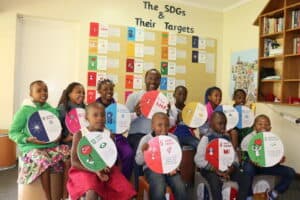
Children in Kenya and Sri Lanka have been learning about sustainable development through a fun and integrated approach. Through Arigatou International’s SDGs Academy for Children, more than 300 children participated in several learning sessions hosted by the SDGs Academy Pioneer Hub in Limuru, Kenya, and SDGs Academy Model Classroom in Colombo, Sri Lanka, within the past year.
These learning sessions covered the overview of “Transforming our world: the 2030 Agenda for Sustainable Development”, highlighting the Sustainable Development Goals (SDGs) in a child-friendly manner.
The sessions also encompassed discussion on ethics and positive values leading to sustainable development, guided by the Learning To Live Together model developed by Arigatou International in collaboration with UNSECO and other key actors.
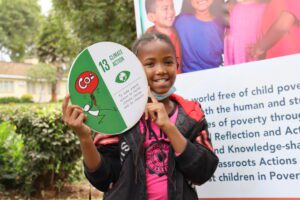 The children, aged 6 to 17 years, further gained a basic understanding of various topics including introductory drone technology and robotics, designing sustainable cities, and climate-smart consumption of food, energy and water. This was accomplished through partnership with organisations such as the Kenya Flying Labs, Ecobana Limited, Excella Biotechnology Limited in Kenya. Partnering organisations in Sri Lanka have been; UNICEF Sri Lanka, The Sustainable Development Councils in Sri Lanka, UNDP, Save the Children Sri Lanka, The Asia Foundation, World Vision, the Department of Sociology, University of Peradeniya.
The children, aged 6 to 17 years, further gained a basic understanding of various topics including introductory drone technology and robotics, designing sustainable cities, and climate-smart consumption of food, energy and water. This was accomplished through partnership with organisations such as the Kenya Flying Labs, Ecobana Limited, Excella Biotechnology Limited in Kenya. Partnering organisations in Sri Lanka have been; UNICEF Sri Lanka, The Sustainable Development Councils in Sri Lanka, UNDP, Save the Children Sri Lanka, The Asia Foundation, World Vision, the Department of Sociology, University of Peradeniya.
As a result of this meaningful children’s participation, these young SDGs champions were able to address stakeholders regarding the SDGs. This was most notably during the ‘Ending Poverty through achieving inclusive education for all’ side-event led by the ATD Fourth World Movement in collaboration with Arigatou International and other partners, at the United Nations High Level Political Forum on the SDGs (HLPF), 17th July 2022 as well as the global commemoration of the International Day for the Eradication of Poverty, 17th October 2022, event also organized by the ATD Fourth World Movement. 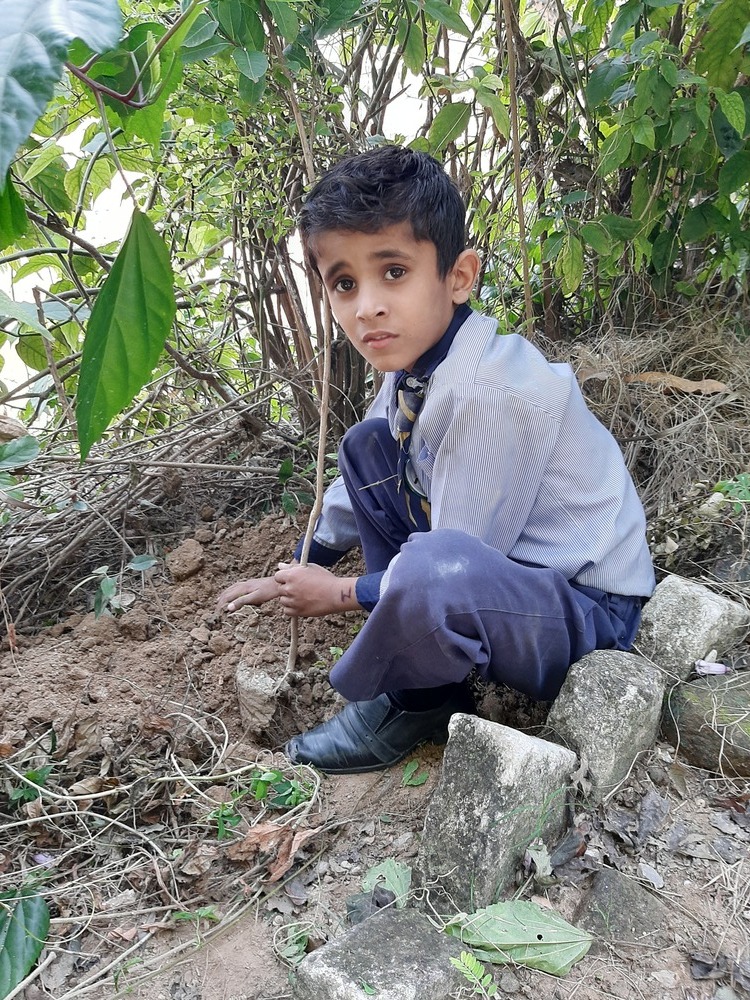
“ I will make my contribution towards sustainable development by mobilizing, educating empowering and raising awareness on the SDGs among children and youth; through various community programmes and campaigns” Sanara, Child from Sri Lanka.
Children particularly served a key role in the ECP@10 Campaign, commemorating 10 years of Arigatou International — End Child Poverty. In addition to participating during the launch of the ECP@10 Campaign on 16th June 2022, the young SDGs champions lead the way in planting hundrends of trees across the world countries, as part of the Grow Trees With Children initiative of the ECP@10 Campaign. Through this specific action, children gave voice to the global concerns on climate change and food security.
Arigatou International’s SDGs Academy for Children (SDGs Academy) is a space and programme for children’s participation, learning and action on the Sustainable Development Goals (SDGs), and the Agenda 2030 in general.
The SDGs Academy covers learning and action on the 5 P’s of the SDGs – People, Planet, Prosperity, Peace and Partnerships. Through this approach, it provides opportunity to bring children’s participation to the fore of sustainable development, while empowering children and their communities towards realization of the SDGs.
Likewise, its online and physical space is organized into 5 hubs being the Knowledge Hub; Capacity Hub; Innovations and Solutions Hub; Dialogue Hub; and the Faith and Fun Hub. On the other hand, the programme comprises of a module-based learning course, storytelling campaign, a multilevel game, as well as advocacy and intergenerational dialogues. It is through these spaces and programme that children learn, reflect and develop with ideas and solutions geared towards the achievement of the SDGs.
Overall, the SDGs Academy for Children presents an innovative opportunity for children to work together with the community around them, towards sustainable development and overcoming child poverty.
In the year ahead, Arigatou International seeks partnerships and the opportunity to expand the reach and positive impact of the SDGs Academy for Children, at grassroots and global levels. We believe that the more children can meaningfully engage in learning and action on sustainable development, the better our collective future will be.
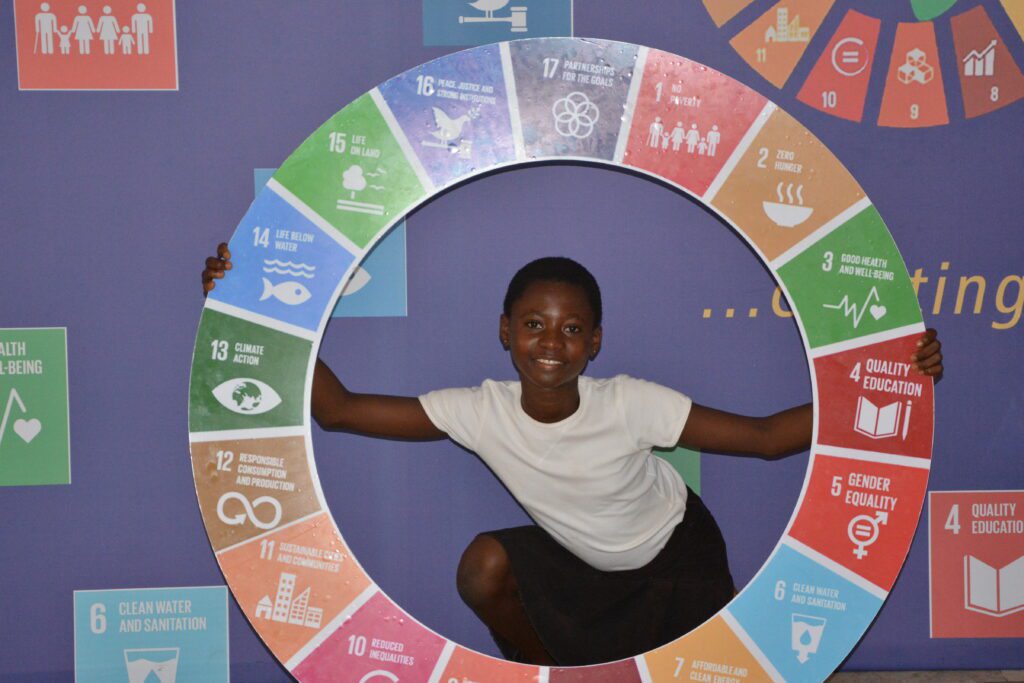
The post <strong>Children leading the way in sustainable development</strong> appeared first on End Child Poverty.
The post Children leading the way in sustainable development appeared first on Arigatou International.
25/01/2023 - Children leading the way in sustainable development

Children in Kenya and Sri Lanka have been learning about sustainable development through a fun and integrated approach. Through Arigatou International’s SDGs Academy for Children, more than 300 children participated in several learning sessions hosted by the SDGs Academy Pioneer Hub in Limuru, Kenya, and SDGs Academy Model Classroom in Colombo, Sri Lanka, within the past year.
These learning sessions covered the overview of “Transforming our world: the 2030 Agenda for Sustainable Development”, highlighting the Sustainable Development Goals (SDGs) in a child-friendly manner.
The sessions also encompassed discussion on ethics and positive values leading to sustainable development, guided by the Learning To Live Together model developed by Arigatou International in collaboration with UNSECO and other key actors.
 The children, aged 6 to 17 years, further gained a basic understanding of various topics including introductory drone technology and robotics, designing sustainable cities, and climate-smart consumption of food, energy and water. This was accomplished through partnership with organisations such as the Kenya Flying Labs, Ecobana Limited, Excella Biotechnology Limited in Kenya. Partnering organisations in Sri Lanka have been; UNICEF Sri Lanka, The Sustainable Development Councils in Sri Lanka, UNDP, Save the Children Sri Lanka, The Asia Foundation, World Vision, the Department of Sociology, University of Peradeniya.
The children, aged 6 to 17 years, further gained a basic understanding of various topics including introductory drone technology and robotics, designing sustainable cities, and climate-smart consumption of food, energy and water. This was accomplished through partnership with organisations such as the Kenya Flying Labs, Ecobana Limited, Excella Biotechnology Limited in Kenya. Partnering organisations in Sri Lanka have been; UNICEF Sri Lanka, The Sustainable Development Councils in Sri Lanka, UNDP, Save the Children Sri Lanka, The Asia Foundation, World Vision, the Department of Sociology, University of Peradeniya.
As a result of this meaningful children’s participation, these young SDGs champions were able to address stakeholders regarding the SDGs. This was most notably during the ‘Ending Poverty through achieving inclusive education for all’ side-event led by the ATD Fourth World Movement in collaboration with Arigatou International and other partners, at the United Nations High Level Political Forum on the SDGs (HLPF), 17th July 2022 as well as the global commemoration of the International Day for the Eradication of Poverty, 17th October 2022, event also organized by the ATD Fourth World Movement. 
“ I will make my contribution towards sustainable development by mobilizing, educating empowering and raising awareness on the SDGs among children and youth; through various community programmes and campaigns” Sanara, Child from Sri Lanka.
Children particularly served a key role in the ECP@10 Campaign, commemorating 10 years of Arigatou International — End Child Poverty. In addition to participating during the launch of the ECP@10 Campaign on 16th June 2022, the young SDGs champions lead the way in planting hundrends of trees across the world countries, as part of the Grow Trees With Children initiative of the ECP@10 Campaign. Through this specific action, children gave voice to the global concerns on climate change and food security.
Arigatou International’s SDGs Academy for Children (SDGs Academy) is a space and programme for children’s participation, learning and action on the Sustainable Development Goals (SDGs), and the Agenda 2030 in general.
The SDGs Academy covers learning and action on the 5 P’s of the SDGs – People, Planet, Prosperity, Peace and Partnerships. Through this approach, it provides opportunity to bring children’s participation to the fore of sustainable development, while empowering children and their communities towards realization of the SDGs.
Likewise, its online and physical space is organized into 5 hubs being the Knowledge Hub; Capacity Hub; Innovations and Solutions Hub; Dialogue Hub; and the Faith and Fun Hub. On the other hand, the programme comprises of a module-based learning course, storytelling campaign, a multilevel game, as well as advocacy and intergenerational dialogues. It is through these spaces and programme that children learn, reflect and develop with ideas and solutions geared towards the achievement of the SDGs.
Overall, the SDGs Academy for Children presents an innovative opportunity for children to work together with the community around them, towards sustainable development and overcoming child poverty.
In the year ahead, Arigatou International seeks partnerships and the opportunity to expand the reach and positive impact of the SDGs Academy for Children, at grassroots and global levels. We believe that the more children can meaningfully engage in learning and action on sustainable development, the better our collective future will be.

The post <strong>Children leading the way in sustainable development</strong> appeared first on End Child Poverty.
The post Children leading the way in sustainable development appeared first on Arigatou International.
24/01/2023 - Education – the fastest way to pull children out of poverty
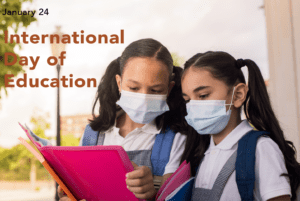
This year’s International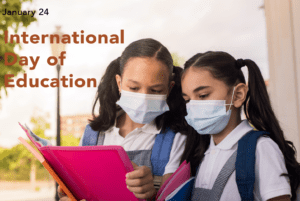 Day of Education theme is ‘To Invest in People, Prioritize Education’. Indeed, quality and inclusive education has been deemed as one of the fastest and surest ways to pull children and entire communities out of poverty. Access to education directly corresponds with the levels of development, as evidenced by measures such as the Human Development Index, Sustainable Development Goals, and the Multidimensional Poverty Index, all across the globe.
Day of Education theme is ‘To Invest in People, Prioritize Education’. Indeed, quality and inclusive education has been deemed as one of the fastest and surest ways to pull children and entire communities out of poverty. Access to education directly corresponds with the levels of development, as evidenced by measures such as the Human Development Index, Sustainable Development Goals, and the Multidimensional Poverty Index, all across the globe.
The Sustainable Development Goals (SDGs) prioritize education, formal, informal and non-formal education, as a means to end all forms of poverty and as an end goal in itself. With less than 7 years left to realize the Agenda 2030 and its SDGs, we need to consider – are we on track to achieving education for all children?
“Ensure inclusive and equitable quality education and promote lifelong learning opportunities for all” – Goal 4, Sustainable Development Goals.
At the height of the Covid-19 global pandemic, children suffered an immeasurable blow to their education as schools worldwide were temporarily shut down, and learning switched from physical classrooms to virtual platforms. Not only did the digital divide impede the progress of the children and schools with inadequate access to online learning infrastructure, but the brunt of the pandemic lead to an increased strain on children’s mental health and wellbeing. More than that, the resultant widespread loss of livelihoods meant that more people were thrust into poverty, thereby affecting children’s education.
Coupled with the growing shocks brought on by climate change and violent conflicts, The total adverse impacts to education are still being experienced globally, even as the severity of pandemic wanes 3 years on. These global upheavals and opportunities necessitate innovative solutions investing in children’s education and outcomes leading to overcoming child poverty.
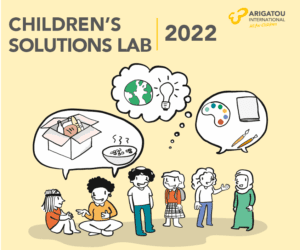 The Children’s Solutions Lab by Arigatou International has been one of such nascent spaces for children to come up with solutions against poverty through education. First launched in 2020, the Children’s Solutions Lab is one of Arigatou International’s meaningful spaces for child participation, whose aim is to support young people in taking action to address poverty affecting children in their communities through solutions based on education. Most noticeable, children from Cuba, India, Malawi and Peru have, through the Children’s Solutions Lab come up with unique and innovative solutions towards promoting education especially for vulnerable children.
The Children’s Solutions Lab by Arigatou International has been one of such nascent spaces for children to come up with solutions against poverty through education. First launched in 2020, the Children’s Solutions Lab is one of Arigatou International’s meaningful spaces for child participation, whose aim is to support young people in taking action to address poverty affecting children in their communities through solutions based on education. Most noticeable, children from Cuba, India, Malawi and Peru have, through the Children’s Solutions Lab come up with unique and innovative solutions towards promoting education especially for vulnerable children.
“Through the Children’s Solutions Lab, we want to focus on how education can help in ending child poverty. We are looking for innovative, sustainable, relevant and replicable solutions that we can support, aimed at ending child poverty” Maria Lucia Uribe – Director Arigatou International – Ethics Education.
The Children’s Solutions Lab seeks to promote ethical reflections among children about the root causes of poverty and how some cultural norms can impact the wellbeing of children and, ultimately, lead to child poverty.
The post <strong>Education – the fastest way to pull children out of poverty</strong> appeared first on End Child Poverty.
The post Education – the fastest way to pull children out of poverty appeared first on Arigatou International.
24/01/2023 - Education – the fastest way to pull children out of poverty

This year’s International Day of Education theme is ‘To Invest in People, Prioritize Education’. Indeed, quality and inclusive education has been deemed as one of the fastest and surest ways to pull children and entire communities out of poverty. Access to education directly corresponds with the levels of development, as evidenced by measures such as the Human Development Index, Sustainable Development Goals, and the Multidimensional Poverty Index, all across the globe.
Day of Education theme is ‘To Invest in People, Prioritize Education’. Indeed, quality and inclusive education has been deemed as one of the fastest and surest ways to pull children and entire communities out of poverty. Access to education directly corresponds with the levels of development, as evidenced by measures such as the Human Development Index, Sustainable Development Goals, and the Multidimensional Poverty Index, all across the globe.
The Sustainable Development Goals (SDGs) prioritize education, formal, informal and non-formal education, as a means to end all forms of poverty and as an end goal in itself. With less than 7 years left to realize the Agenda 2030 and its SDGs, we need to consider – are we on track to achieving education for all children?
“Ensure inclusive and equitable quality education and promote lifelong learning opportunities for all” – Goal 4, Sustainable Development Goals.
At the height of the Covid-19 global pandemic, children suffered an immeasurable blow to their education as schools worldwide were temporarily shut down, and learning switched from physical classrooms to virtual platforms. Not only did the digital divide impede the progress of the children and schools with inadequate access to online learning infrastructure, but the brunt of the pandemic lead to an increased strain on children’s mental health and wellbeing. More than that, the resultant widespread loss of livelihoods meant that more people were thrust into poverty, thereby affecting children’s education.
Coupled with the growing shocks brought on by climate change and violent conflicts, The total adverse impacts to education are still being experienced globally, even as the severity of pandemic wanes 3 years on. These global upheavals and opportunities necessitate innovative solutions investing in children’s education and outcomes leading to overcoming child poverty.
 The Children’s Solutions Lab by Arigatou International has been one of such nascent spaces for children to come up with solutions against poverty through education. First launched in 2020, the Children’s Solutions Lab is one of Arigatou International’s meaningful spaces for child participation, whose aim is to support young people in taking action to address poverty affecting children in their communities through solutions based on education. Most noticeable, children from Cuba, India, Malawi and Peru have, through the Children’s Solutions Lab come up with unique and innovative solutions towards promoting education especially for vulnerable children.
The Children’s Solutions Lab by Arigatou International has been one of such nascent spaces for children to come up with solutions against poverty through education. First launched in 2020, the Children’s Solutions Lab is one of Arigatou International’s meaningful spaces for child participation, whose aim is to support young people in taking action to address poverty affecting children in their communities through solutions based on education. Most noticeable, children from Cuba, India, Malawi and Peru have, through the Children’s Solutions Lab come up with unique and innovative solutions towards promoting education especially for vulnerable children.
“Through the Children’s Solutions Lab, we want to focus on how education can help in ending child poverty. We are looking for innovative, sustainable, relevant and replicable solutions that we can support, aimed at ending child poverty” Maria Lucia Uribe – Director Arigatou International – Ethics Education.
The Children’s Solutions Lab seeks to promote ethical reflections among children about the root causes of poverty and how some cultural norms can impact the wellbeing of children and, ultimately, lead to child poverty.
The post <strong>Education – the fastest way to pull children out of poverty</strong> appeared first on End Child Poverty.
The post Education – the fastest way to pull children out of poverty appeared first on Arigatou International.
20/01/2023 - Promoting social cohesion through community dialogue
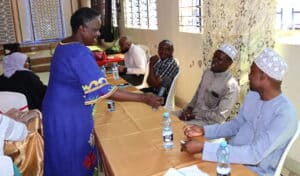
Arigatou International – End Child Poverty in collaboration with the Uzalendo Afrika Initiative and Elim Fellowship Church, Nyali – Mombasa organised a community dialogue between 28th – 29th November; bringing together over 50 diverse participants/stakeholders in the community. They included; youth, women, religious leaders and government officials. Community dialogues is a critical lifeline to promoting peace as they provide the perfect avenues for partnerships between different actors within the community.
Acknowledging that peacebuilding out- comes do not follow a linear pathway of change, the community dialogue was positioned to provide an opportunity for to not only contextualize drivers of conflict but assess the levels of conflict, review and monitor some of the emerging new dynamics around Preventing, Countering Violent Extremism (PCVE), faith, and elections.
“We need to look at Freedom of Religion or Belief (FoRB) within the context of communities. Religious leaders need to help communities in understanding and proper interpretation of religious texts” Gerald Acho, Regional Peace Programme Lead; Arigatou International – End Child Poverty. The community conversations revealed that in order to build social cohesion, some tenets towards sustainable social cohesion were identified as collaboration with different stakeholders, em- powering others to give feedback on work done on social cohesion and inclusion of leaders at different levels. While meaningful and consistent dialogue sessions were lauded as effective ways to building stronger and cohesive communities, youth and women were called upon to take up available opportunities and initiatives in communities and within government to empower themselves and help build more cohesive communities.
Read on the community dialogue
The post <strong>Promoting social cohesion through community dialogue</strong> appeared first on End Child Poverty.
The post Promoting social cohesion through community dialogue appeared first on Arigatou International.
20/01/2023 - Promoting social cohesion through community dialogue

Arigatou International – End Child Poverty in collaboration with the Uzalendo Afrika Initiative and Elim Fellowship Church, Nyali – Mombasa organised a community dialogue between 28th – 29th November; bringing together over 50 diverse participants/stakeholders in the community. They included; youth, women, religious leaders and government officials. Community dialogues is a critical lifeline to promoting peace as they provide the perfect avenues for partnerships between different actors within the community.
Acknowledging that peacebuilding out- comes do not follow a linear pathway of change, the community dialogue was positioned to provide an opportunity for to not only contextualize drivers of conflict but assess the levels of conflict, review and monitor some of the emerging new dynamics around Preventing, Countering Violent Extremism (PCVE), faith, and elections.
“We need to look at Freedom of Religion or Belief (FoRB) within the context of communities. Religious leaders need to help communities in understanding and proper interpretation of religious texts” Gerald Acho, Regional Peace Programme Lead; Arigatou International – End Child Poverty. The community conversations revealed that in order to build social cohesion, some tenets towards sustainable social cohesion were identified as collaboration with different stakeholders, em- powering others to give feedback on work done on social cohesion and inclusion of leaders at different levels. While meaningful and consistent dialogue sessions were lauded as effective ways to building stronger and cohesive communities, youth and women were called upon to take up available opportunities and initiatives in communities and within government to empower themselves and help build more cohesive communities.
Read on the community dialogue
The post <strong>Promoting social cohesion through community dialogue</strong> appeared first on End Child Poverty.
The post Promoting social cohesion through community dialogue appeared first on Arigatou International.
15/01/2023 - ‘Grow trees with Children’ – Sri Lanka
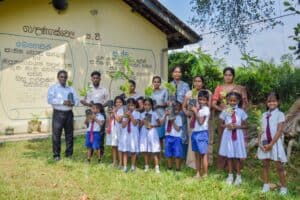
The End Child Poverty 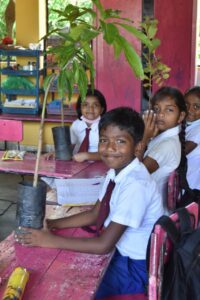 Knowledge Centre, joined hands with the Sarvodaya Shramadana Movement in planting trees to commemorate ECP@10 (10th anniversary of Arigatou International – End Child Poverty).
Knowledge Centre, joined hands with the Sarvodaya Shramadana Movement in planting trees to commemorate ECP@10 (10th anniversary of Arigatou International – End Child Poverty).
The Knowledge Center visited two schools in Galle District where they planted hundreds of trees and distributed tree seedlings among children, parents, teachers and staff and members of Sarvodaya Shramadana Societies to plant a in their gardens. These tree seedlings were carefully selected to be compatible with the ecosystem in the area as well as fruit trees to promote zero hunger. They included Jack Plants, Cashew Plants, Mango Plants and Guava plants.
The tree-planting campaign is being conducted in 25 districts in Sri Lanka and aims to plant more than 2000 plants across the country. Tree planting is part of the wider ECP@10 campaign and aims to grow 1 million trees worldwide as a way of mobilizing our constituencies to face the challenge of climate change and its nexus. with poverty.
The post <strong>‘Grow trees with Children’ – Sri Lanka</strong> appeared first on End Child Poverty.
The post ‘Grow trees with Children’ – Sri Lanka appeared first on Arigatou International.
15/01/2023 - ‘Grow trees with Children’ – Sri Lanka

The End Child Poverty  Knowledge Centre, joined hands with the Sarvodaya Shramadana Movement in planting trees to commemorate ECP@10 (10th anniversary of Arigatou International – End Child Poverty).
Knowledge Centre, joined hands with the Sarvodaya Shramadana Movement in planting trees to commemorate ECP@10 (10th anniversary of Arigatou International – End Child Poverty).
The Knowledge Center visited two schools in Galle District where they planted hundreds of trees and distributed tree seedlings among children, parents, teachers and staff and members of Sarvodaya Shramadana Societies to plant a in their gardens. These tree seedlings were carefully selected to be compatible with the ecosystem in the area as well as fruit trees to promote zero hunger. They included Jack Plants, Cashew Plants, Mango Plants and Guava plants.
The tree-planting campaign is being conducted in 25 districts in Sri Lanka and aims to plant more than 2000 plants across the country. Tree planting is part of the wider ECP@10 campaign and aims to grow 1 million trees worldwide as a way of mobilizing our constituencies to face the challenge of climate change and its nexus. with poverty.
The post <strong>‘Grow trees with Children’ – Sri Lanka</strong> appeared first on End Child Poverty.
The post ‘Grow trees with Children’ – Sri Lanka appeared first on Arigatou International.
20/12/2022 - 2022 Highlights – Staff Picks

Another highlight was the launch of the ECP@10 Campaign, it was a strong and well-coordinated event. I was proud that the launch and subsequent campaign was well received. I also thoroughly enjoyed the SDGs Academy first children’s residential camp at the Pioneer Hub in Limuru, Kenya. It was so much fun and the children amazed me with their ability to engage with the lessons we presented. Plus interacting and spending time with the GNRC Kenya volunteers during the camp was a really great experience. Thank you for walking with us! Fred Nyabera: This year we’ve seen superb children’s participation, and this includes within our celebration of ECP@10 and also the SDGs Academy – how the children were able to grasp the concepts and be able to articulate in their own way. So, that would be one of my highlights, and of course another one to me would be, being able to synthesise and consolidate our actions for the last 10 years and seeing the impacts of that (work).
Fred Nyabera: This year we’ve seen superb children’s participation, and this includes within our celebration of ECP@10 and also the SDGs Academy – how the children were able to grasp the concepts and be able to articulate in their own way. So, that would be one of my highlights, and of course another one to me would be, being able to synthesise and consolidate our actions for the last 10 years and seeing the impacts of that (work).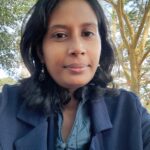 Hesha Perera: One of my highlights has been the launch of the Sustainable Development Goals (SDGs) Academy for Children Model Classroom, by the End Child Poverty Knowledge Centre and the Sarvodaya Headquarters in Sri Lanka. The SDGs Academy uses concepts and dimensions of Global Development Education (GDE) that enable people (children) to develop the knowledge, skills, values and attitudes needed for securing a just, sustainable world in which everyone has the right to fulfill their potential. Through this, Sanara, a volunteer aged 17, shared her experience on how she started work on SDGs, and how the SDGs Model Classroom will be helpful for her and the children in Sri Lanka as a safe place for children to learn about SDGs.
Hesha Perera: One of my highlights has been the launch of the Sustainable Development Goals (SDGs) Academy for Children Model Classroom, by the End Child Poverty Knowledge Centre and the Sarvodaya Headquarters in Sri Lanka. The SDGs Academy uses concepts and dimensions of Global Development Education (GDE) that enable people (children) to develop the knowledge, skills, values and attitudes needed for securing a just, sustainable world in which everyone has the right to fulfill their potential. Through this, Sanara, a volunteer aged 17, shared her experience on how she started work on SDGs, and how the SDGs Model Classroom will be helpful for her and the children in Sri Lanka as a safe place for children to learn about SDGs.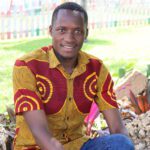 Kefe Innocent: This year’s Children’s Solutions Lab (CL 2022) is my highlight, because it’s an idea that received such immense and a positive reception, based on the improvement we observed this year over the 2020/21 Children’s Solutions Lab. People from all walks of life applied, and there was an increased number of applications from various countries. Also, the ideas (by the children’s groups) were amazing. Through the CSL, we continue to raise awareness about this issue (ending child poverty) at a lobal platform. The CSL 2022 has been a perfect platform to expand the reach of Arigatou International, to children’s groups and to those organisations that work with children.
Kefe Innocent: This year’s Children’s Solutions Lab (CL 2022) is my highlight, because it’s an idea that received such immense and a positive reception, based on the improvement we observed this year over the 2020/21 Children’s Solutions Lab. People from all walks of life applied, and there was an increased number of applications from various countries. Also, the ideas (by the children’s groups) were amazing. Through the CSL, we continue to raise awareness about this issue (ending child poverty) at a lobal platform. The CSL 2022 has been a perfect platform to expand the reach of Arigatou International, to children’s groups and to those organisations that work with children.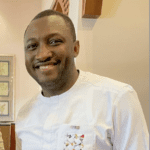 Michael Adikwu: My highlight for the year was the SDGs Academy first residential session, because it confirmed the reality and worth of the programme. We were able to work with children, 6 to 9 years, for such a good event. Every child has the right to enjoy a sustainably developed world. Providing a safe space for children to participate in building this world is my utmost priority and joy.
Michael Adikwu: My highlight for the year was the SDGs Academy first residential session, because it confirmed the reality and worth of the programme. We were able to work with children, 6 to 9 years, for such a good event. Every child has the right to enjoy a sustainably developed world. Providing a safe space for children to participate in building this world is my utmost priority and joy. Nyambura Gichuki: My highlight this year has been the ECP@10 Campaign and all its component actions. It’s amazing to see how far we’ve progressed and how much good we’ve accomplished in partnership with others, since End Child Poverty was launched in Dar es Salaam, Tanzania, back in 2012. It reaffirms what we say as a team, that “Together We Can”.
Nyambura Gichuki: My highlight this year has been the ECP@10 Campaign and all its component actions. It’s amazing to see how far we’ve progressed and how much good we’ve accomplished in partnership with others, since End Child Poverty was launched in Dar es Salaam, Tanzania, back in 2012. It reaffirms what we say as a team, that “Together We Can”.
The post 2022 Highlights – Staff Picks appeared first on End Child Poverty.
The post 2022 Highlights – Staff Picks appeared first on Arigatou International.






